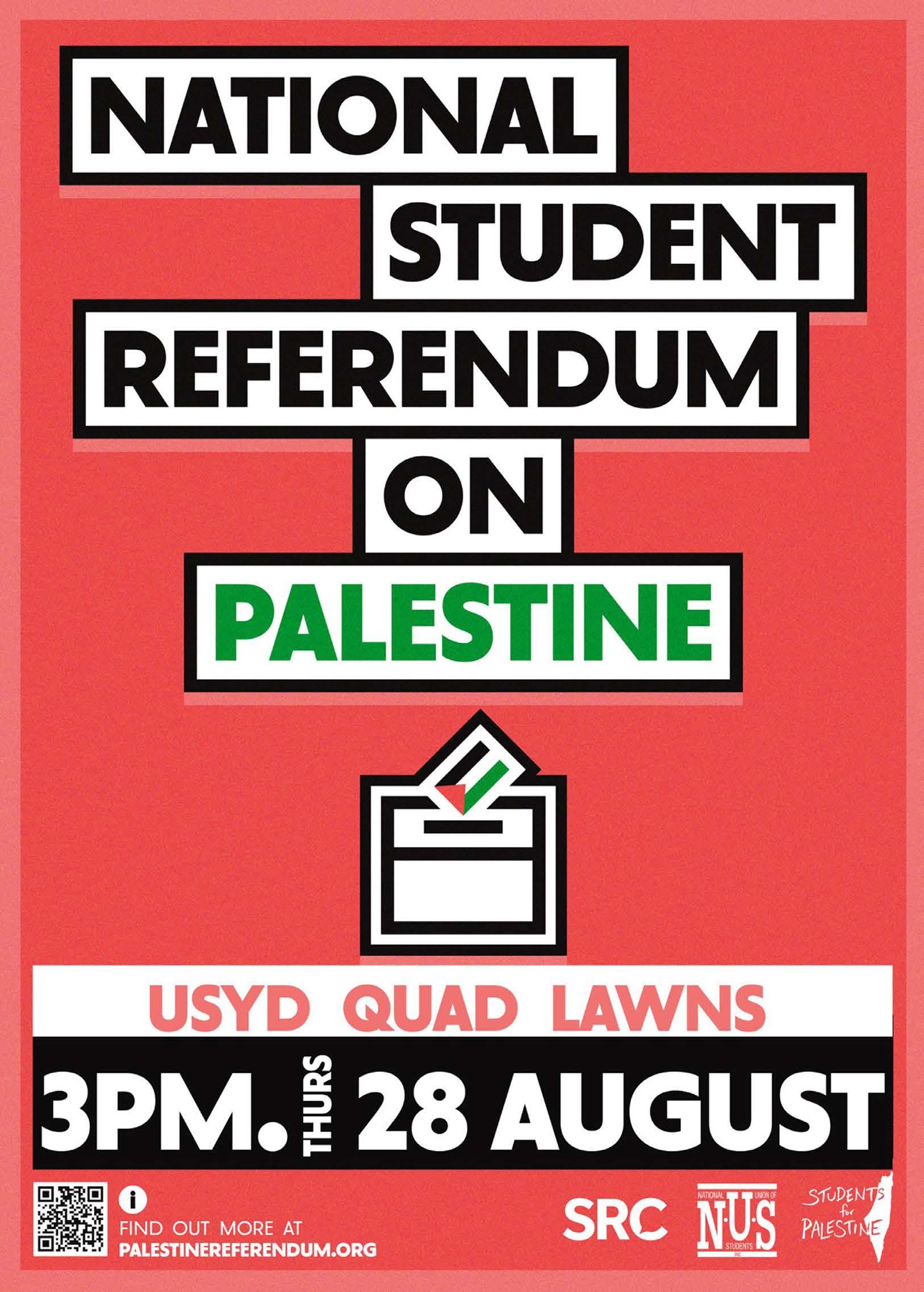Week 4, Semester 2, 2025
HONI SOIT
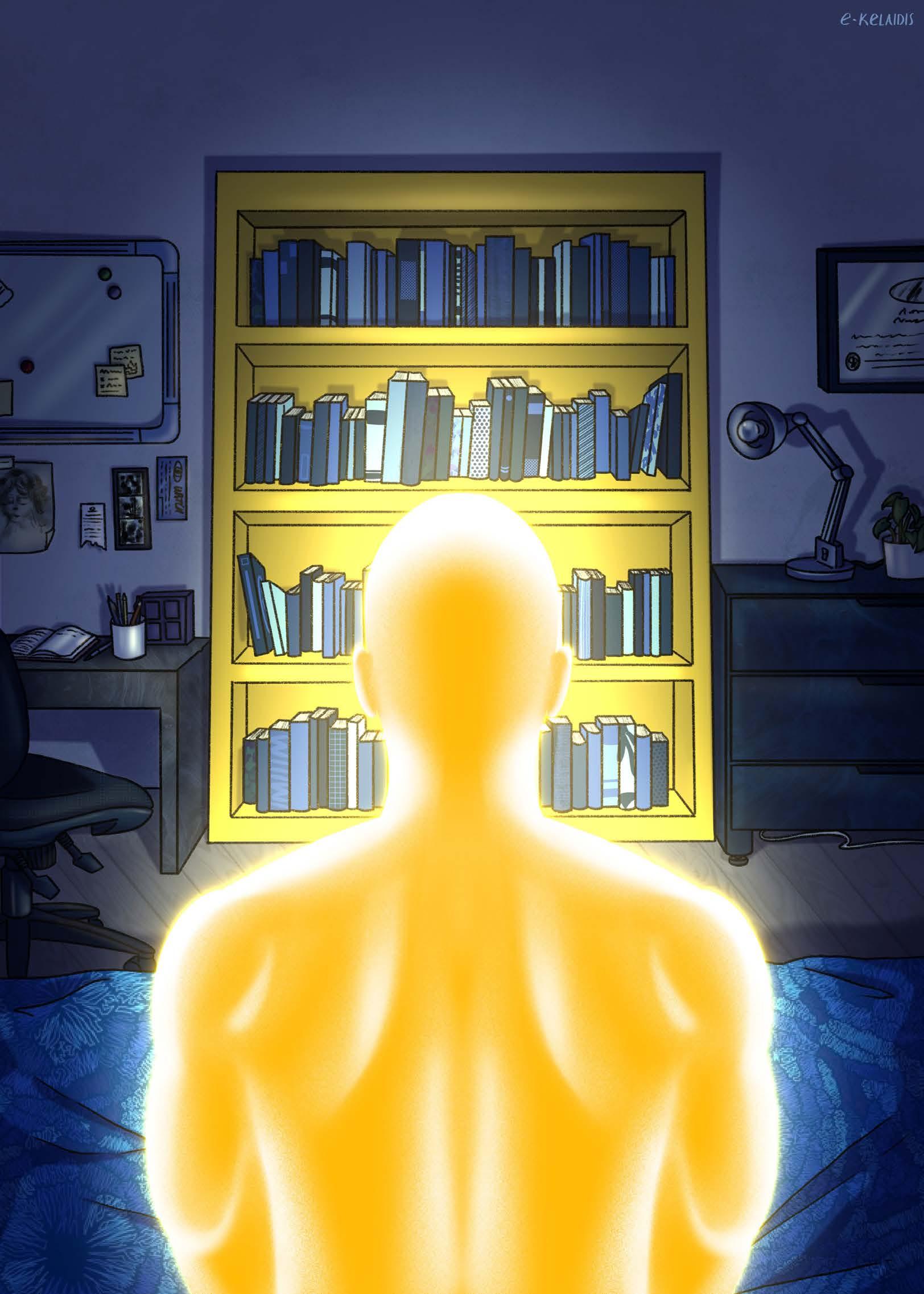
From Loneliness, Towards Community
Gender is Unconscious. You are Unconscious.
In Gaza, Men are Made Before they are Born


Honi Soit operates and publishes on Gadigal land of the Eora nation. We work and produce this publication on stolen land where sovereignty was never ceded. The University of Sydney is a colonial institution. Honi Soit is a publication that prioritises the voices of those who challenge colonial rhetorics. We strive to continue its legacy as a radical left-wing newspaper providing students with a unique opportunity to express their diverse voices and counter the biases of mainstream media.
Editors
Comedy
Ah, men. Love them, hate them, they are inevitable.
They are our friends, our lovers, and our enemies. They unwittingly hold copious amounts of structural power and use it with an unwieldy grip. We occasionally believe that the world would be better if they didn’t exist.
We often say that as a throwaway comment, a sort of knowing wink that we don’t really believe they should all die, but we say it enough that there’s some truth behind it.
I’m fascinated as of late by the notion of progressive guilt, that is, the kind of guilt we hold as self-proclaimed progressives for holding beliefs which go against the ‘discourse’. One of these, for me, is the belief that we cannot stop trusting that men can be better.
It can feel like a waste to expend emotions on discussing men while the most fundamental rights for women are still not comfortably secured. Yet, it is necessary. We, as a society, no longer have a clear path forward for men. They are lost.
If we hold on for a second, and we all agree that there is a problem with men in our society, and that the only true way forward in any sort of equitable or feminist movement is to involve men, then what does that tangibly look like?
Companion Piece, Echo Kelaidis
It is an uncomfortable question. Even writing this, I feel the urge to turn away from men as a point of study. It feels like staring at the sun. Yet, we must look.
My feature this week is a constructivist call-to-arms, a plea to see gender for what it is: a structural impulse upheld by its invisibility. I ask for us to step out of our skins and feel the air around us. Dissecting my relationship with masculinity is a time-honoured tradition in my writing for Honi. The article is a culmination of years of self-surveillance, gender interrogation, and hope.
It is also, I believe, evidence that a gender studies degree equips you with skills beyond just being a barista.
Sift through these blue-palette pages and discover an interrogation of our current state of play in the field of masculinity. Read Jesse Carpenter’s version of events which created our performative male epidemic. Observe Sophie Bagster’s incendiary analysis of why male sex dolls threaten to dislodge the patriarchal sexualisation of women. Deepdive into Ewan C’s vivisection of queer male culture, and why we seem to be the community most willing to publicly body shame. Seek truth.
With love, and the hope I finally write my honours thesis,
Will Winter he/they
For this cover we wanted to evoke a “great realisation of self”. The main figure is glowing, illuminating the room. We wanted this person to shine and almost transcend a recognisable form. I pictured the person to be masculine yet ethereal as to emphasise the acceptance of masculinity and self. The yellow bookshelf stuffed with books was a fun inclusion as a sort of significant tool for introspection and discovering oneself.
Purny Ahmed, Mehnaaz Hossain, Ondine Karpinellison, Ellie Robertson, Imogen Sabey, Charlotte Saker, Will Winter, Victor Zhang
Front Cover
Echo Kelaidis
Purny Ahmed, Jaseena Al Helo, Sophie Bagster, Jesse Carpenter, Ewan C., Felicity Errington, Louis Friend, Zoe Gelagin, Victoria Gillespie, Ariana Haghighi, Cormac Herron, Mehnaaz Hossain, Ondine Karpinellison, Michael Krizan, Ellie Robertson, Imogen Sabey, Charlotte Saker, Jessica Louise Smith, Elaquare Spencer, Ananya Thirumalai, Will Winter, Victor Zhang
Artists
Purny Ahmed, Ellie Robertson, Will Winter
Dear Honey
Dear Honey,
I need some advice on navigating the cesspool that is Grindr on campus. I’m off the other apps, cause love obviously isn’t real, but Grindr doesn’t purport to be about love. For the uninitiated, here’s what you need to know: Grindr is a faceless, nameless feed of horny twenty and/or sixty-five year olds, and the algorithm is based on nothing but distance measured in metres. Yes, metres.
This is serviceable when I’m holed away in Western Sydney and wanting to discover which other homosexuals are vaguely around me, so I can fantasise about sneaking out of the house and fucking some man with a shitty beard and deep, deep self-loathing due to his homosexual tendencies. Fantasise is the key word there, since I’m yet to actually meet anyone off this app. But on campus, it is difficult to exist in the semi-public that is Grindr.
My problem is that I don’t feel comfortable showing my face on my profile. Right now it is a photo of me in a colourful shirt (to chase away all the people looking for “real men”) with a pretty necklace (which gets many compliments). But it also means I’m part of the anonymised cycle, which means I’m part of the problem.
There’s a couple reasons for this choice. I’m not shirtless because I am not muscly, so my body is not one which is picked first on the menu. My incredible ass is unfortunately off the table (sorry boys), so using that as a selling point is deceptive. There’s also this feeling that by being me on Grindr, instead of a vaguely anonymous body who has discretion to let in interested (and attractive) suitors to the privilege of seeing my face, then I’m emotionally committing to giving up on finding love.
Do I just show my face anyway? A part of me is worried I’ll be known on campus as someone who
Rumour Has It...
uses Grindr, and maybe even get recognised by someone who I’ve sent a picture of my penis to. I cannot tell you the amount of queers on campus whose private parts I’ve been unwittingly exposed to...
But I also talk openly about being on there anyway to my frie [sic] and my dreams of being a public figure are long to be realised. It also means I’d be skipping the excruciating point in conversation where the other person says “hey do you have a face pic” and then I send one and then I get blocked. It also means that within this community of mine (not just the gay men, but specifically the unabashedly sexual gay men), I’d be existing as one of them, and not some enlightened gay who is merely testing the waters of depravity.
I’m sure you can tell that being on this app at all is pulverising my self-esteem and exacerbating years of insecurity, but I’m here now, so I need someone to push me to take the leap. Help me Honey. Make me feel less bad for being gutwrenchingly horny.
Dear anonymous person whose name I do not know because you didn’t include a sign off and I have no idea at all who you are at all,
Firstly, you’ve already stated that you don’t feel comfortable putting your face on your profile, so why is this still a question? You already know what you want. I will not sit here and encourage you to “take the leap“ towards living uncomfortably with yourself.
Secondly, get off Grindr. It doesn’t seem like it’s doing you any good.
Sign off, Honey
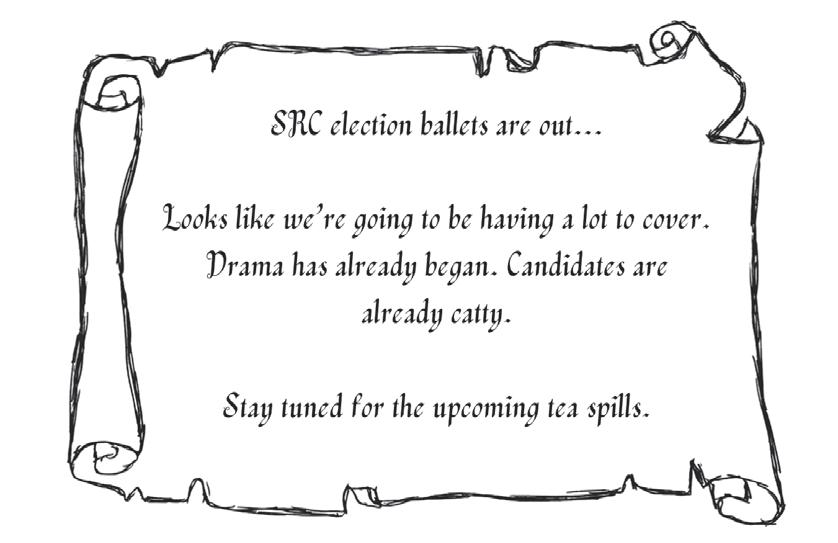
WHAT’S ON?
No Exits by SUDS 27th–30th of August, 3rd–6th of September Cellar Theatre
Engineering Revue 28th–30th of August Seymour Centre
Law Revue 28th–30th of August Seymour Centre
Stimulate Art and Music Nights 29th of August, 5pm Old Teachers’ College
SASS 1978 Queer Mag x POC Revue zine launch 29th of August, 7pm Newtown Hotel
SASS Cruise 4th of September
Med Revue 18th–20th of September
Seymour Centre


Four presidential hopefuls and the first contested Honi Soit election since 2021
Victor Zhang reports.
With the ballot draw for the election of the 98th Students’ Representative Council (SRC) released, we can now report on what will likely be the most interesting SRC election in recent memory.
Those Who Want to Be Us
There has not been a contested Honi Soit election since 2021, where CAKE secured the editorship of the 94th SRC’s Honi against DRIP
Two tickets of editorial hopefuls will be contesting this election, with Burn and Flash facing off for the editorship.
Eko Bautista, Madison Burland, Anastasia Dale, Kuyili Karthik, Ramla Khalid, Marc Paniza, Kiah Nanavati, James Fitzgerald
Sice, Faye Tang, and Sebastien Tuzilovic are running on Burn for Honi. They have collectively written 104 pieces, 10 of which are news pieces.
Sath Balasuriya, Felicity
Errington, Audrey Hawkins, Cormac Herron, Jenna Rees, Jessica Louise Smith, Tanish Tanjil, and Ananya Thirumalai will be running on Flash for Honi They have written 51 pieces, none of which are news pieces.
“We
Those Who Want to Oversee Us
We have seen nominations from four presidential hopefuls. In the order of names on the ballot draw:
Angus Dermody (Solidarity), activist in Solidarity and Students Against War, and former SRC Environment Officer, spoke to the need to prioritise “the fight for Palestine on campus” while the government and university “won’t stop sending the weapons parts, or sending students on exchange to apartheid universities”. He states the SRC needs to “bring the fight to management to force them to cut ties” and to mobilise the student body, and “look[s] forward to making the case to students to be a part of the fight for Palestine with other activists in Students Against War.”
Grace Street (Grassroots), current SRC General Secretary and former Education Officer, stated a desire to build on the work she has been involved in over the past two years in making the SRC “more visible, accessible, and staunchly involved in the campaigns for a free Palestine, to demand paid placements, to push the University to provide
free vaccination and other health services”. She also cited the need for strong leadership in the 98th SRC to aid in the “battle to end institutional support for Israel [and] our University staff bargaining for better teaching and learning conditions”.
Muhammadhasankhon Munavvarkhonov, having no known factional affiliations, said the SRC should “serve every single student rather than just political factions” and focus on “real student problems and on delivering practical outcomes”. Munavvarkhonov did not elaborate on specific policies.
Sargun Saluja (NSWLS), former University of Sydney Union (USU) Board Director and SRC Interfaith Officer, is campaigning on policies such as “affordable housing, transport concessions, cheaper, more diverse food (including muchneeded Indian), and cutting ties with weapons companies”. Saluja stated that “amid rising xenophobia”, she is “running for a campus where international students are recognised as students, and the Left is united.” Saluja states that if elected she may “possibly [be] the first International Student
SRC President, a title that should have belonged to someone before [herself]”.
Those Who Want a Piece of the Pie
There are an unprecedented 43 seats up for grabs on the 98th Council. 259 candidates across 51 tickets have formed across the various factions. Even with the trend of a steadily climbing turnout year-on-year, the record 43 spots may pull down the quota to secure a seat on council.
Preferences, within brands and outside of brands, are then of the utmost importance — with a significant number of councillors being elected not by surpassing quotas but on eliminations, surplus transfers, and preferences.
Grassroots are running tickets under their eponymous ‘Grassroots’ brand and ‘Free Palestine’. Socialist Alternative (SAlt) are running tickets under the familiar ‘Left Action’ branding with an additional ticket under ‘Palestine Action’.
Penta are running a record 15 tickets under ‘Penta’ and ‘International Students for SRC’.
Of the Labor Left factions, New South Wales Labor Students (NSWLS) are running under the ‘Impact’ brand, which they used last year. The remaining National Labor Students (NLS) have adopted ‘Explicit’ this year. Young Centre Unity, or Labor Right, are running under ‘Unite’.
Solidarity are running under ‘Sanction Israel’. Members of the Queer Action Collective are running a ticket under ‘Queer Agenda for SRC’.
A smattering of independents have also appeared on the ballot draw. Lachlan Mansour, after a failed bid for a spot on the USU Board, is running under ‘The Restoration Party’. We are unsure of what is being restored.
Presidential hopeful Hasan Munavvarkhonov is running alone on ‘Change Your SRC’.
There are also the two tickets ‘Engineering for SRC’ and ‘Science for SRC’, not to be confused with ‘STEM for SRC’ which is run by Young Centre Unity.
are running out of time”: Nationwide March for Palestine
Mehnaaz Hossain, Ondine Karpinellison, and Ellie Robertson report.
On 24th August, the Palestine Action Group (PAG) organised the Nationwide March for Palestine. The Sydney rally was held in Hyde Park and, according to PAG, over 100,000 people were in attendance, as well as thousands more across the country.
Uncle Chris Edwards, a Kamilaroi man from North Western NSW and survivor of the Stolen Generation, opened the rally with a Welcome to Country.
Josh Lees, PAG organiser, spoke to the increase of union support in the Palestine movement as he introduced the first speaker of the rally, NSW Teachers’ Federation Deputy President Henry Rajendra. Rajendra affirmed the Federation’s commitment to the movement. He proclaimed that “peace is union business” and resolved to work with the union movement and wider community civil to achieve peace and justice for the Palestinian people.
Amal Nasser, PAG organiser, highlighted the significance of the protest. She noted that over 40 cities and towns across Australia had registered their involvement in the national rally. Nasser explained that as we approach almost 2 years of genocide, calling on the goverment to impose crippling economic sanctions on Israel has never been more important.
Journalist Antoinette Lattouf, who recently successfully sued the ABC for unlawful termination after being fired for sharing a social media post about Gaza, began her speech with “Journalism is not a crime.”
Wearing a shirt with the names of over 180 Palestinian journalists murdered by Israel, Lattouf cited numerous examples of Israel’s war crimes against journalists in Gaza.
She spoke particularly about Anas Al Sharif, a 28-year-old Al Jazeera frontline journalist in northern
Unions endorsing the movement include the National Tertiary Education Union (NTEU), the Maritime Union of Australia (MUA), and the Retail and Fast Food Workers’ Union (RAFFWU).
Gaza who was murdered by an Israeli airstrike on a media tent near Al-Shifa hospital. Lattouf explained that “Before his death, he wrote a will that reads less like a farewell and more like an indictment: ‘I have lived pain in all its details. I have tasted pain and loss repeatedly. Despite this, I have never hesitated to convey the truth, as is, without distortion or falsification…”
Lattouf cited that 184 Palestinian journalists and media workers have been slain since October 2023, compared to 18 in the entire war between Russia and Ukraine. This makes Gaza the deadliest ‘conflict zone’ for journalists.
Sue Higginson, NSW Greens Member for the Legislative Council, invigorated the crowd by reminding us of the 300,000 people at the Harbour Bridge ‘March for Humanity’ just three weeks ago. She spoke to the need for action beyond recognition of a Palestinian State, specifically for sanctions against Israel.
Former Australian of the Year and sexual assault victim-survivor
activist Grace Tame began her speech by acknowledging that what is happening in Palestine affects everyone: socially, economically, and ecologically. Tame called out those who have been cowered into silence, as “evil thrives in silence.” She directly challenged the Albanese government’s complicity, referencing the ongoing arms trade with Israel. Speaking to a sprawling crowd, Tame’s statement that public pressure is one of few forces power responds to rings true.
Before announcing the final speaker, Josh Lees spoke to upcoming events in support of the movement. He noted the upcoming National Student Referendum on Palestine is to be held on Thursday 28th August in all tertiary education campuses across Australia. Students will have the chance to vote and demand “an end to all weapons sales to Israel by Australia and Australian companies, and call for sanctions on Israel.”
Lees also spoke about the ‘March for Australia’ organised by fascist far-right groups taking
place next Sunday. He deplored the hypocrisy of mass media’s ‘antisemitism’ fearmongering whilst they platform a march organised by actual antisemites, self-identified neo-Nazis. He reaffirmed the necessity of showing solidarity with the Palestine cause next Sunday to counter the hateful ‘protest’.
Finally, Palestinian activist and law student Raneem Emad closed the speeches by stating, “This fight is not easy. It is exhausting…” Two months ago, Emad spoke at a PAG rally and reported the loss of her cousin.
On Tuesday she learnt that her maternal family home had been bombed to the ground, and another cousin of hers had been killed by a drone. She left that home in January 2023 and expected to be able to return. Emad emphasised the brutal nature of the Israeli occupation and the importance of demanding an end to the genocide.
Following the speeches, thousands marched across Sydney’s city centre, from Hyde to Belmore Park.
Professor John
Keane
and Dr Nick Riemer begin crowdfunding for defence against Class Action Lawsuit
University of Sydney academics
Professor John Keane and Dr Nick Riemer have started a Chuffed.org crowdfunding page for their defence in the Federal Court. This comes after a class action lawsuit was filed against both the University and the two academics on the grounds of alleged anti-semitism.
The complainants are a group of staff and students who allege that the university — in its response to the Gaza solidarity encampments of 2024 — and the two academics, engaged in “unlawful discrimination against Jewish people.”
The Chuffed.org page is titled ‘Help USyd Palestine advocates defeat Israel Lobby legal attack’. They state that Keane and Riemer are “long-time advocates of freedom and justice for Palestinians” and that “they have loudly opposed the genocide, defended Palestinians’ right to resistance as recognised by international law, and promoted the cause of a just and lasting peace for everyone in the Middle East, regardless of their ethnicity, religion or social background.”
The page includes a subsection on how Keane and Riemer’s case
speaks to a broader ability to criticise Zionism without legal challenge and free speech on Israel.
“If John and Nick lose, then no one will be able to criticise Zionism”, the page states.
“John and Nick’s case covers different ground from other recent cases in Australia. The case against them, which is brought under Australia’s Racial Discrimination Act, will be the first to explicitly test whether Zionism should be protected under race hate laws. If Palestine supporters can’t say what John and Nick have said, then nobody in future will be able to say anything.”
The page also directs supporters to the open letter shared to Overland literary journal on 29th May 2025, in which Jewish university staff and students expressed solidarity with the academics. Dr David Brophy from the University of Sydney, who had his Palestine flag removed from his office window on August 7, has also shared the Chuffed.org page on X. At the time of publication, $68,174 has been raised.
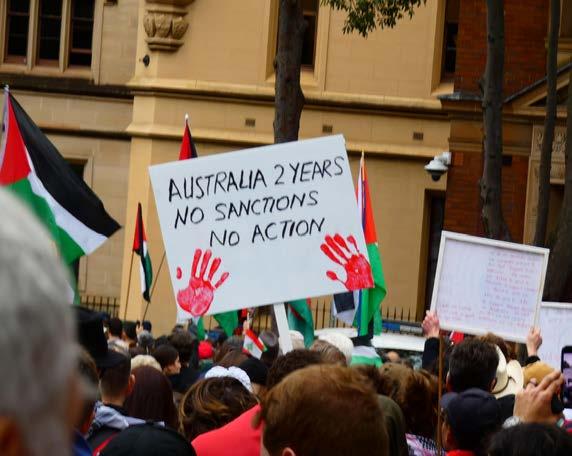
NTEU Instagram
ANU announces $250 million savings target to be achieved without further involuntary redundancies
Imogen Sabey reports.
The Australian National University (ANU) ViceChancellor Genevieve Bell has told staff via email that there will be no more involuntary redundancies in future savings plans under the ‘Renew ANU’ scheme.
Bell added that there would be no further change proposals released in 2025.
The Renew ANU program came after ANU reported a $400 million deficit. The scheme aims to cut spending by $150 million and salaries by $100 million by 1st January 2026. This includes the axing of 650 jobs.
Renew ANU has saved $59.9 million so far. It is currently in its third phase.
Despite the pause in involuntary redundancies, Bell announced that there would be a second Voluntary Separation Scheme (VSS) commencing next week.
Bell wrote that the remaining $189.9 million of ANU’s savings goal would come from “lift and shift/realignments, continuation of the Recruitment Advisory Committee (RAC),
natural attrition, and voluntary separations”.
Dr Liz Allen, an academic at ANU, commented on X that “The language was ambiguous and could be read to say all forced redundancies would stop. I received many messages from people being forced out. Were they now safe?”
Joseph Mann, an ANU student, said to Honi “Studentshave been happy to hear that there won’t be further forced redundancies, but the announcement doesn’t roll back any of the destructive cuts that have been announced to crucial parts of the university — like the School of Music or the Dictionary Centre — so far. To that extent, it’s disappointing and feels inauthentic.”
Following ANU’s significant cost-cutting measures, the university has seen a slew of blistering headlines. These include Chancellor Julie Bishop’s $790,000 expenditures, bullying allegations against Bishop, and most recently ANU music students alleging that the dissolution of the ANU music school is a breach of ANU’s legislation and consumer law.
Universities put on notice with two inquiries and warning from Minister Jason Clare
Victor Zhang reports.
The NSW tertiary education sector has been placed on notice as a parliamentary inquiry into the university sector was established on 18th August and the federal senate inquiry into Quality of governance at Australian higher education providers was re-adopted for the 48th Parliament.
The NSW Legislative Council established the inquiry, chaired by Member for the Legislative Council Dr Sarah Kaine (ALP), after receiving a petition with 2,619 signatures calling for an inquiry into the governance of the higher education sector. Submissions to the inquiry close on 17th October.
The inquiry will report on matters relating to: legislative frameworks governing universities in NSW, oversight responsibilities shared between state and federal bodies, the accountability of university councils (the peak governing
body of each university), and opportunities for legislative reform to strengthen university governance.
National Tertiary Education Union (NTEU) NSW Division
Secretary Vince Caughley stated in response to the inquiry that “we wholeheartedly welcome this inquiry as a testament to [the] powerful voices of NTEU members and the strength of workers”.
He continued, “cuts are not inevitable. They are choices about priorities. Universities must be run in the public interest with accountable governance and fair, secure jobs.”
The NTEU held a protest outside of the Australian Financial Review Higher Education Summit on 19th August.
At the rally, Senator for NSW Dr Mehreen Faruqi spoke to the
dire state of universities: “Those speaking up are punished, free speech is suppressed, and staff and students have less and less say in how their universities are run.”
Meanwhile, Federal Education Minister Jason Clare told the AFR summit that “university governance is not up to scratch” citing “distressing evidence” on wage theft and sexual assault and harrassment at universities, heard at a public hearing of the federal inquiry into university governance.
The Federal Senate inquiry into Quality of governance at Australian higher education providers, chaired by Senator Tony Sheldon, is seeking submissions until 28th August, with public hearings scheduled in the coming months. The inquiry will deliver its report on 4th December.
Dinner menu: Grilled Honi
Mehnaaz Hossain, Imogen Sabey, Charlotte Saker, and Victor Zhang report.
We began with a thorny Question Time. Firstly, Remy Lebreton (Grassroots, Disabilities Officer) asked Angus Fisher (President, NSWLS) about items passed by the Council which he had not actioned. Fisher responded “A lot of those action items are contingent on people submitting things to me.”
Usually, Honi editors take the role of observing a Council and rarely speaking at one. However, a regulatory motion to formalise the resignation of three editors led to questions from the floor on why the editors left. Honi wishes to clarify that the editors did not depart at the same time; we have not had a team of ten since April. Imogen Sabey responded to questions on the editorial departures and moved a procedural to raise a motion to the top of the agenda, which sought to appoint Ondine Karpinellison as a new Honi editor. The procedural and motion passed, and Ondine was duly elected.
The Council moved to condemn the recent changes to NSW rental regulations that weakened the tenant protections against no-grounds evictions. The mover Remy Lebreton (Grassroots, Disabilities Officer) stated the changes open a “blatant loophole that any landlord can use to just get immediately around the no-ground evictions laws” while highlighting the ludicrousness of the ‘Labor for Housing’
action group set up with the blessing of the NSW Premier amidst these changes.
Motion Q4 condemned the NSW police for murdering Colin Burling during a welfare check. Burling, a 45-year-old gay man, was ordered by the police to go to the hospital against his will, and was subsequently violently restrained. Wendy Thompson (QuAC, Queer Officer) spoke to the inadequacy of police in being first responders, stating that instead of responding with care, “they sent police instead to do a welfare check and when he got distressed about that, the NSW Police decided the right response was to kill him.”
Motion R1 reflected on the historic March for Humanity across the Harbour Bridge and committed the SRC to building the Palestine movement was joined by a discussion by the Council on strategies to organise. Jasmine Al Rawi (SAlt, Education Officer) moved the motion stating “it does not alienate students to mobilise mass protests”.
Shovan Bhattarai (SAlt, VP) spoke to the National Student Referendum on Palestine to be held on 28th August at every tertiary institution across the country and implored every faction on the Council to dedicate resources to building for the referendum.
2025 July USU Board Meeting: Numbers Edition
Charlotte Saker reports.
In the lead up to Semester 2, the July USU Board Meeting was filled with fresh new faces ready to serve and protect the Union’s — and of course, students’ — interests for the next two years. With a sprinkle of financial jargon and a dash of bureaucracy, the Board offered notable insights into the Semester ahead and finally gave Honi what we’ve been begging for: the 2025 meeting minutes up on the website.
To kick off, new club applications opened for the USU, with 110 stalls allocated for Welcome Week. Honorary Secretary Ethan Floyd facilitated the establishment of the First Nations Student Society.
The portfolio reports highlighted the work of former Honorary Secretary Julia Lim, noting the development of a new Clubs and Societies matrix that was set to be implemented in mid-July. Environment and Equity Portfolio holder Layla Wang announced plans to integrate a sustainability strategy into the Clubs and Societies system. Meanwhile the Impact Report, which was distributed to all major stakeholders on campus, revealed a 35 per cent increase in visits to FoodHub amid the cost of living crisis.
Moving to the finance and risk register, the Board discussed the June financials and July forecast. The USU delivered a surplus
due to well-performing investments in June with higher dividend income and HostCo revenues.
The Board moved to discuss a request for a ‘Live Music Event’ for Palestine at Manning Bar. Brought to the USU by a group of students (not a USU club), the proceeds are to go to select charities in Gaza. Politically, the USU usually regards itself as impartial. However, a Board member noted that the event could be “for the betterment of the organisation, considering we have groups on both sides on campus.”
Senate Appointed Director Michael Bromley acknowledged the value of the cause, but stated that “it could be inflammatory”. Honi wonders how a musical event to help children starving in Gaza could possibly be ‘inflammatory’.
Honi also received a status update on the Red Zone Report investigation: no progress. The investigation is on pause until the USU receives output from the University’s investigation.
The USU is yet to formally rename the Disabilities Community Room in honour of former SRC Disabilities Officer, Khanh Tran. Honi would like the USU to get a move on with this one.
Is it Really (Went)Worth the Money?
Ariana Haghighi is against fence-sitting.
The University of Sydney (USyd) is characterised by sandstone tradition, an image perpetuated by its marketing team and bureaucratic structures. One of its central marketing tactics is its literary prizes, which often slip by majority of the student populace, but are used to reveal the high quality of the student literati. There is no student literary prize better recognised than the Wentworth Medal, which is accompanied by a sizeable bounty of $20,000.
The Wentworth Medal involves writing a 3,000-word essay on a topic of various socio-political interest. In past years, the winning essay has been published online or through mainstream media channels, serving both as a point of discourse and as advertising material for the University. Previous essay topics include Aboriginal land sovereignty and interdisciplinary responses to combatting climate change.
It should come as no surprise that this year’s Wentworth Medal question attempts to ‘fence-sit’ about the issue of
free speech and protesting on campus, all while serving as a dogwhistle to right-wing and Zionist rhetoric about Pro-Palestinian student movements. This year’s question reads as follows:
“How can we effectively promote the principles of academic freedom while ensuring safety and fostering social harmony in our multicultural community?”
To any USyd student who has received University communications about the ongoing genocide in Gaza , this phrasing is not new. In October 2023, following an escalation of the genocide in Gaza, the Office of the Vice-Chancellor circulated the directive, “Now more than ever it is important for us to be guided by our values of diversity, inclusion, and the principle of disagreeing well.”
Though this appears to support student freedoms, these ‘values’ were repeatedly twisted in the face of student actions in subsequent years.
The idea that protest puts “safety” and “social harmony” at risk has been repeatedly touted as a reason to dismantle peaceful protests such as the 2024 Gaza Solidarity Encampment or avoid committing to boycott, divestment, and sanction (BDS) demands, undergirded by claims that these actions make Jewish students feel “unsafe”.
Weaponisation of ‘safetyism’ is not exclusive to USyd, and has been employed by University management teams across the country to quash student protest and even suspend or expel students, such as in the case of the University of Melbourne’s response to the 2024 peaceful lie-in. This concept has been promoted by those allegedly left-of-centre, such as Zadie Smith in her essay for The New Yorker, where she sympathises with concerns of student emotional safety over peaceful encampments.
One must ask, where are the concerns over feelings of safety for student activists, and in particular Palestinian and
Middle Eastern students? The Victorian information watchdog has found that the University of Melbourne breached privacy laws in collecting students’ location data during 2024 campus protests. At the Australian National University, students who organised the encampment on Kambri lawns were sent emails threatening disciplinary action with little notice and recourse. At USyd, staff have received threats from students over discussing relevant content in their classes, such as the use of passive voice to conceal the perpetrators of genocide in a Media and Communications class.
Based on the history of USyd’s reliance on “safetyism” to quash student protest and academic freedom, it is likely they have a certain lens in mind for the Wentworth winner. How an answer can tackle this without directly questioning the oppressive acts this University has taken is an enigma yet to be unravelled.
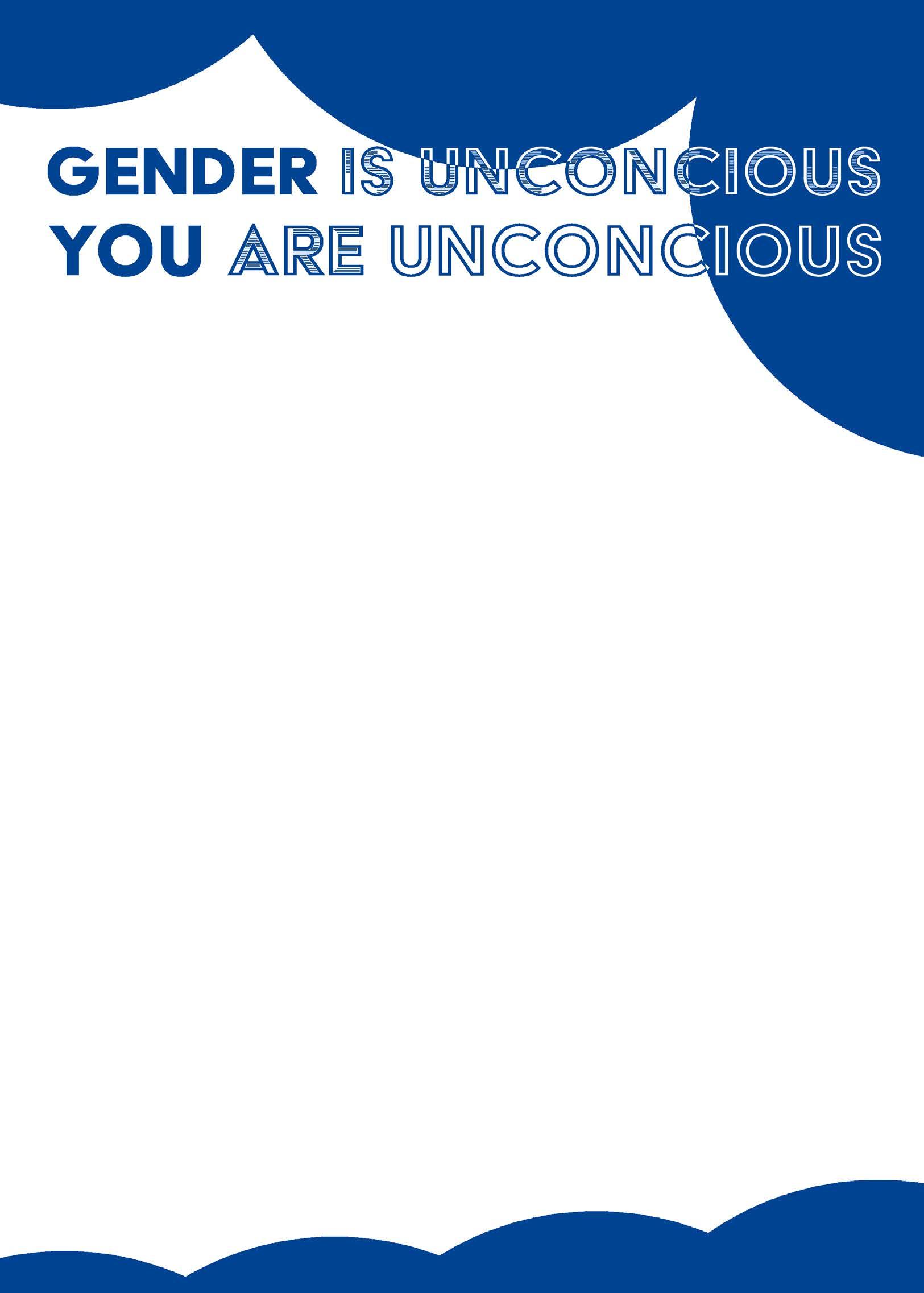
Will Winter wakes up.
There’s no such thing as a good man.
Let’s take this statement twofold. There is no such thing as a good man, because there is no such thing as a man. There is no way for one to be good at being a man in any sort of objective sense, because if we truly attempt to interrogate what a man is, that term crumbles. If one holds man in their hands, it falls between fingers like sand, or grief.
If we take the progressive assumption of gender as a social construct and sex as biological, we assume a purity of science and biology which is simply unfounded. There is no pure metric for assessing a male and female biology with distinction. There are no consistent chromosomes, hormones, or genitalia which truly purport to be male or female. Rates of intersex presence in the human population range from 1.7 per cent to 0.015 per cent. The range is such because there is no real medical consensus on what defines an intersex person.
Isn’t it strange that we can theoretically define a ‘male’ and a ‘female’ but not what exists in-between? Surely something definable should have identifiable boundaries?
Intersex generally refers to bodies which, by virtue of their physicality or chromosomal disposition, sexually vary from coherent understandings of a male or female binary body. Beyond troubling the conceptualisation of ‘intersex’ as an identity which is given to an individual upon their sexual presentation being classed a medical ‘problem’, on the strictest end of the scale, the 0.015 per cent of world population, there are over a million people worldwide who cannot cleanly define themselves as sexually or ‘biologically’ male or female. If we take the other end, it’s closer to 140 million. That’s the same proportion as redheads.
Intersex, as a presumably ‘biological’ term, does not contend with individuals whose bodies are sexually normative but whose presentation is not. The concerns with the term ‘intersex’, then, are purely from a supposed ‘scientific’ standpoint.
Intersex individuals, typically those who visibly and obviously present as such from birth through either their external genitals or internal sexual organs, have historically been (and still are) forced to undergo medically unnecessary procedures to ‘correct’ their sexual ‘abnormalities’ at birth. The Australian Human Rights Commission identifies these practices of ‘rectifying’ tissue and organ as predominantly medically unnecessary. In Australia, ACT is the only state or territory which legally requires medical professionals to not operate on intersex babies unless medically necessary.
How can we accept sex as a biological reality when unconsenting medical corrections of aesthetic sexual abnormalities that trouble our definitions of ‘men’ and ‘women’ are not only normalised but state-sanctioned? How can we accept intersex as the exception that proves the ‘rule’ of there being two sexes, without acknowledging that if sex was a biological fact it wouldn’t need rules to prove its existence?
I would argue that most of us shouldn’t.
You cannot be a good man because you don’t know what a man is. Biologically, this is a certainty. Rendered through gender, you may have a sense of what a man is, but you’ll discover quickly that your definition is not coherent, nor universal.
Analysing gender is like spinning a pizza in the air. Not gender on a personal innate level, nor gender through the eyes of another person, but rather, gender as this intangible, invisible, world-making tool which constructs our society in myriad ways seen and unseen. Let it spin and spin in your hands, malleable and doughy. Feel the way it compresses into the parts of your body which are most tactile to you, your fingers. Let the dough turn in the air, forever able to be worked, as you feel yourself unravel. There is no end to an interrogation of gender, as much as there is no true end to spinning a pizza base. You just decide at some point that you’ve had enough of spinning, enough of introspection, and accept your gender as reality. Being a man is being familiar with the way society props its arms under yours, as if carrying someone unconscious, and walks you towards the other men as a point of completion.
Gender is unconscious. You are unconscious.
Michel Foucault coined the term ‘panopticon’ in relation to gender in 1979. A French critical theorist and prolific homosexual, Foucault had an explicit focus on systems of punishment and discipline, and he bridged these understandings through his conceptualisation of gender. A panopticon is a circular structure in the centre of a prison. Its glass is opaque. Its presence is unavoidable. Its power comes from its mystery: you can never know if the security guards within the complex are watching you, therefore you always assume they are.
“Each individual, in his place, is securely confined to a cell from which he is seen from the front by the supervisor; but the side walls
prevent him from coming into contact with his companions. He is seen, but he does not see; he is the object of information, never a subject in communication.”
Restricted between side walls, men are not in communication about their gender. They learn about how to be a man from the men around them, from conversation and observation, but they do so unaware of the fact that they’re learning gender They assume they are just learning about life, distinct from the womanly or non-man experience of forever conceptualising yourself in relation to your gender, and the masculine. If we do not provide men the tools with which to communicate their gender, it can never be put in true contention. Wait, hold that thought. Let’s keep walking through surveillance.
The panopticon stands in the centre of the prison and watches. Not the guards, but the panopticon itself, watches. It watches you, it is suggested, to ensure you are compliant. You’re so unsure if someone is actually observing you that you act as if they are at any given moment.
“Hence the major effect of the Panopticon: to induce in the inmate a state of conscious and permanent visibility that assure the automatic functioning of power. So to arrange things that the surveillance is permanent in its effects, even if it is discontinuous in its action; that the perfection of power should be to render its actual exercise unnecessary; that this architectural apparatus should be a machine for creating and sustaining a power relation independent of the person who exercises it; in short, that the inmates should be caught up in a power situation of which they are themselves the bearers.”
The panopticon passes the buck of surveillance from the security guards to yourself. The panopticon is self-surveillance. You do not need to be seen to be afflicted by your need for compliance. You do not need someone to comment on you and your gender to be aware that you are being perceived. This is a self-regulatory system. You are the panopticon when you put on your outfit in your own bedroom and you look in your own mirror and think “this does not feel manly” or “this makes me look like a woman” or, by extension “I am not enough”. You are at once subject and object: your perpetual observations of self are what keep you imprisoned.

The first thing we notice about someone is usually their gender. We have a lingual necessity to identify an individual’s pronouns so as to reference them. We also will make assumptions based on someone’s clothes, hands, posture, hips, voice, cheekbones, lashes, hair, the presence of make-up, the size of shoe, the spirit with which they carry themself. You do it to others, and you do it to yourself. Once you see gender on other people, then you begin to uncover the gender all around us. It is marked on our bathroom stalls, our classrooms, our bodies, and our assumptions.
Your gender also exists in relation to others. Gender, as a discursive system, is perpetually made and remade through relationality. Judith Butler, the revolutionary constructivist whose foreboding presence hangs over the domain of gender studies, pens the term ‘citationality’ as a way of interpreting the creation of gender as an a priori identity. Instead of assuming that ‘man’ and ‘woman’ are identities which exist as truth and from which we act, Butler suggests that ‘man’ and ‘woman’ are identities which we perpetually construct through intaking and outputting actions and words that are conflated to create gender.
“In opposition to theatrical or phenomenological models which take the gendered self to be prior to its acts, I will understand constituting acts not only as constituting the identity of the actor, but as constituting that identity as a compelling illusion, an object of belief.”
Without delving into the complexities of phenomenology or semiotics, citationality can be simply described as such: when you clock someone doing something which you attach a gender to, you mark it as a citation in your head. “That person has long hair, they are probably a woman”. Then, in this big phone book that you keep in your head, you continually attach these actions and words to genders, so that the next time you encounter them, you have a point of reference.
Everyone’s big phone book in their head is different, but together they form a structure of visibility which attaches every action to gender. In this sense, gender becomes structural.
Our own systems of knowing become entangled with how other people define their systems of knowing.
As you pull and tug at this structure, it feels as if you are trapped in a sticky web. You can resist, you can move, you can wriggle and breathe and, if you work hard enough, feel unconstricted even, but you will always be caught in the web.
As you begin to define yourself and others outside of this binary of ‘man’ and ‘woman’, and as you create these spaces of non-binaryness which are marked with promises of genderless mullets and theoretical freedoms, you inadvertently continue to mark the bounds of acceptable masculinity and femininity.
“If the ground of gender identity is the stylized repetition of acts through time, and not a seemingly seamless identity, then the possibilities of gender transformation are to be found in the arbitrary relation between such acts, in the possibility of a different sort of repeating… gender might be understood as constituted and, hence, capable of being constituted differently.”
Structurally, as individuals living in a citational societal, any attempts to define oneself or objects outside of a binary reinforce the existence of the binary. By defining yourself as ‘not-man’ or ‘notwoman’, there is an inevitability of carving out the space of what a ‘man’ and ‘woman’ are. Sometimes, persistent attempts to define something outside of the binary can even result in that thing becoming part of the binary. We can trek the societal response to long hair on boys, when, as late as the 2000s, it was wholesale considered ‘womanly’ to have long hair, and thus boys with long-hair were ‘womanly’. Boys with long-hair were only sexy in an androgynous, alt way. Nowadays that ‘alt’ characterisation has become subsumed by a progressive male aesthetic. The wolf cut is a masculine cut for our generation; it has become ‘manly’ to have long hair. The citation of long hair, then, has reshaped itself from ‘woman thing’ to ‘man doing woman thing’ to ‘man thing’.
As ‘woman’ things become masculine for men, ‘man’ things become androgynous for women. Makeup is warpaint, but a woman’s short hair is gender-neutral. A woman in an oversized baggy shirt is androgynous, rarely masculine. Men do not perform androgyny; they masculinise things. Men cannot exist in the chasm of androgyny because it threatens teetering over into femininity. We move goalposts that maintain masculinity as a ‘man’ thing and femininity as a ‘non-man’ thing. Gender, thus, becomes a self-fulfilling prophecy. There is no way to escape it. Androgyny is a symptom, not the cure.
If we accept that we exist within this structure, this totalising imprisonment of gender, then your ability to float between the panopticon and the prison is based on your connection to the male ‘sex’. To return to Foucault:
“All the mechanisms of power, even today, are disposed around the abnormal individual, to brand him and to alter him.”
We notice the “abnormal individual” as one who transgresses gender, especially the male gender, because we are so rooted in gender. Gender is how we love, how we live, how we form community, bonds, and emotions. Because we structure society around gender, individuals who don’t conform are not a threat to a ‘natural’ order, but are a threat to the purposeful, conditional order which we accept as natural due to the human desire for structure.
Gender is a deliberate system which inherently subjugates and stratifies. Gender is maintained by governments and by babies, knowingly and unwittingly. Gender is indoctrination into our modes of living. It is also truth. This is where the paradox of gender unravels: in saying the word ‘gender’ enough, it begins to feel meaningless or claustrophobic, because it is both of those things, but it is also the most powerful tool of self-identification one can wield. The “abnormal individual” is branded as such due to the dissonance between their sex and their gender, a dissonance which has the potential for radical joy and self-confidence. This dissonance, if ever wielded by community or structurally, holds anti-establishment power. Naturally, establishments do not like this.
Gender is unconscious. You are unconscious.
The panopticon, then, is not merely a tool of selfsurveillance, but one operated by broader societal structures to maintain normative conceptions of self and enforce modes of gender and control.
I throw all of these words into the air not to construe a sense of gender anarchy in the world, but rather
to demonstrate how gender is a structural tool of identity formation. Gender essentialism must be combatted: both in the sense that gender correlates with a biological truth, and more broadly, to suggest that gender is not merely a pre-existing identity, but a way of negotiating one’s own relation to the world.
Gender is a system, and not merely a way of understanding, because people need order, and gender is an impervious way for power structures to enforce order under the guise of nature. People do not like anarchy.
We build systems like hours of the day and traffic lights to provide structure and comfort, but then we forget that we made these systems and they feel uncorruptible. We defined them ourselves. We believe in the mythology of time and laws and gender because they provide us security. This is a good thing. They should not provide us with essentialism. That is a bad thing.
Let’s go back to the original claim. There is no such thing as a good man.
You cannot be a good man in a second sense, in the sense of goodness as a pure and wholesome notion, because the only way to exist as a good man in our current patriarchal clutches is to throw yourself off a cliff.
We assume that there is no way to feasibly overthrow the panopticon through individual will alone. Therefore, we are still living in a system of gender. This system of gender, as most of the enlightened minds I know are aware, is patriarchy. We are stuck in a world which assumes a male gaze. We see masculinity as strong and femininity as beautiful, then define a man by his proximity to masculinity and a woman to femininity. Even our subversions are still rooted in this relation. Our new era of dream boys are golden retrievers, soft. Women, our favourite women, are strong, either while being feminine or in spite of their femininity. We do not know how to shake this. There is no collective resistance when gender’s greatest strength is its supposed invisibility. As long as we turn our eyes towards issues of gender within the system, we will never contend with how we structure gender as a system.
Men, of course, aren’t the only ones who perpetuate patriarchy. We are all complicit. Some men have broken through the matrix and can supposedly see patriarchy and their relation to it. But gender is such a totalising, gripping structural power that there is no true way to exist outside of it for as long as it exists unconfronted societally. Therefore, men who are able to recognise that there is a problem within the current system, who can recognise that the system is inevitable under our current confines of understanding, and who claim to be good, have an obligation to throw themselves off a cliff.
That’s the only solution for as long as we navel-gaze at the problem of ‘men’ and ‘women’, to suggest that issues of gender are issues faced by ‘men’ and ‘women’ within the structure of gender, and are not problems of gender. Structural issues of wage gaps and gendered violence and war and misogyny and emotional unavailability all come back to the way gender is designed. They cannot be truly reckoned with until we understand gender as a purposeful system that will replicate these dynamics of power in perpetuity.
A man who is capable of recognising how he is part of the problem cannot fix it by merely fixing himself. I think of myself as a good man. However, I do not wish to throw myself off a cliff. I argue instead that we cannot fix the problem of men without fixing this problem of gender
What is the problem of men? Men are lost. This is not an assumption, but a statement of the times. Masculinity once had a certain place in the Western world. Men were breadwinners who came home to a cooked dinner. Masculinity meant strength, stoicism, and severe emotional disconnect. Masculinity was built in a paradigm in which, as the central axis from which our world spun, femininity revolved around it. Man and wo-man. Conditional. From the rib, woman was born.
Now we understand this dynamic to create and replicate societies of unbalance. Men who are violent and powerful. Men who do not respect women by virtue of being women. Men who structurally benefit from being aggressive and aggrandising and who walk around with unfettered confidence and ego. So we restructure. We uplift women. And as such, men begin to feel displaced.
When does this become an issue? When men, generally not forced to interrogate their gender, need to do so in order to render themselves visible in this new dynamic. Men who are ‘men’ exist unseen by the panopticon because they float between being the prison and being the guard. When the panopticon is planted with a masculine root, and the feminine is derived as an oppositional category, then men do not need to introspect about their relationship to masculinity as consistently as women and non-men do. They do not need to contend with how they are seen and created through a male gaze, because they are the male gaze.
Men are not given the tools to think of themselves as gendered objects.
Whilst they lack these tools, men will always exist in panopticon and be completely unaware of it. Only those outside of the tower understand that existing within it retains its power. Only those within the tower truly have the power to dismantle it.
Non-men are also sick of men. The burden of emotional labour is one which is consistently placed on non-men. We are tired of forever reiterating the existence of patriarchy, misogyny, and structural discrimination. Those of us who date men approach them like projects, and when we cannot fix them, then they never were able to be fixed at all. Statistically, boys are consistently shown less physical affection by their parents than girls from birth. They are less likely to be given the language or space to have deep emotions. Girls suffer from being forced into positions of emotional investment and care from early ages; boys are not given the ability to do so at all.
Men need to be shown empathy for how the world pushes them away.
This is a difficult ask: to show men empathy, when so often they are the ones who cause us to be distressed. Men are the violent ones. They are the powerful ones. They, especially the young ones, are also vulnerable to a world which suggests that they are toxic and terrible, and which provides no alternatives.
The alt-right is able to take the place it does because no one else is willing to look at men, young men, and say “Hey, we know your role as a man is not as clearly defined as it used to be for the older men around you. We know you’re scared. We see you. Let’s figure this out.” The alt-right does. That recognition is not the problem. The problem is that their suggestions for how things should be are active repackagings of misogyny with a Gen Z sheen. The enlightened path forward for men, actively engaging them in a system of equity and empathy, should be built by other men, but they cannot herd sheep unless given tools by the shepherd.
Masculinity persists as a tool of violence and power because it defines itself by its existence. Campaigns to turn men into emotional beings do not attempt to make it okay to be feminine, but rather masculinise feminine things. Saying that it’s manly to cry continues to suggest that being a man is the goal, is the ‘good’ state of being.
So I turn the concept of men over and over in my hands like a many-sided marble, and I ponder the solution. How do we fix a problem so broad and grasping and entrenched?
We need conceptions of gender which are untethered to power and structure. We do not need an ungendered society, because there is no such thing. We need men and women and non-binary and trans and cis and genderqueer. This is a language which provides meaning, hope, and revelation. It allows us to feel comfortable in our bodies, to seek others alike with us, and, when wielded correctly, saves lives, by allowing one to reify their spirit with their identity. What we need instead is a collective reckoning with the world, and all of the multitudinous ways we casually accept gender as a fact of life and not as an illusion which we all willingly choose to uphold.
I turn my gaze to myself. I seek truth.
I went to an all-boys school. Those six years define how I approach the world. All-boys schools are microcosms of masculinity. They taught me that a man was loud, aggressive, and intellectually domineering. They also taught me how to exist within my own body, a pudgy, smoothened, feminine existence.
I look at my father. I see him as the strong man he is: built, passionate, kind, funny, strong. I see him, with his indelicacy and massive heart, and I see what it means for me to be a man. To be a man is to be loyal. It is to be open. It is to be willing to learn, listen, and love profoundly.
I do not conform to what it means to be a ‘man’, as in to be emotionally closedoff and stagnant. This was once a weakness, the closing of the door that I would ever live a normative life. It is now my strength. I did not feminise myself to become woman, but rather to soften my edges, to relax the walls around me and discover a sort of hybridised existence. I weaponise confidence and kindness and my unabashedly highpitched voice. I am empathetic, I listen, I give good hugs, and I like to think I am a beacon of comfort to those around me. None of this is garnered from my identity as a ‘man’. All of this, I made the choice to become.
Still, I refute a purely non-binary identity, not just because I align myself with my cis body, but because I still define myself as homosexual. Trans men, cis men, bi men, queer men, and occasionally straight men all catch my fancy. I feel my heart flutter in my stomach when a pretty boy kisses me in his car. I feel this as a boy who likes boys. This is truth.
When removed from the system, when it is felt, gender is truth. It exists. We all cultivate gender as a social bearing, like time or traffic lights. We all experience gender euphoria in the world. We should all be afforded the privilege and ability to possess gender, to discover ourselves and community using this language, to wade in the waters of the sex assigned to you or transgress and find yourself somewhere else instead.
Gender is a choice. Gender is also unconscious. You are unconscious. You must seek truth.
The system is the problem. It always has been. Stringing gender into a framework of power was where it all went wrong. Step back. Look at your hands. Look at what you find. Gender is a tool. It is a tool of conception, of imprisonment, and of reformation. Before it can be wielded for good, it must be seen for what it masquerades as: a citational, patriarchal, heap of systemic bullshit.
Leave the panopticon. Look in the mirror. Find a way to see you as your own person. Seek gender as a form of identity-making, of community, love, and visibility. As a form of revolution.
Wake up.


Fluent in Honi
The first time I picked up a copy of Honi Soit, I put it back. Not because it wasn’t interesting, but because it felt like stumbling into the middle of a conversation where everyone else already knew the punchline. There were references to Students’ Representative Council (SRC) motions, in-jokes about campus factions, and a rhythm to the writing that assumed a kind of cultural fluency I didn’t yet have. Who were these people? What were these acronyms? And why did I feel like I needed a glossary just to read a student paper? Eight months later, I would fill out a reporter callout form, wait long enough to forget I’d applied, and only hear back at the end of the year. By then, I’d started to realise my experience wasn’t unusual. For many international students, Honi is less a welcoming front door and more a locked gate: one that requires a map, a password, and perhaps a friend on the inside.
For the uninitiated, Honi Soit is the University of Sydney’s weekly, student-edited paper, known for its sharp political commentary and cultural criticism. Produced by an elected editorial team under the SRC — the peak student advocacy body — it often reflects the language and culture of “stupol” (student politics). The SRC runs services, lobbies on policy issues, and represents students to the university and government, but its inner workings can be opaque to those outside its circles.
Tanish Tanjil, a 2025 Honi reporter, said “Socially, it is really hard to break into Honi or even SRC and student politics spaces. I actually wanted to get more involved in SRC, but I had no idea how it worked. The whole world of student politics, colleges, and law people knowing the “tea” felt really closed off.
“I went to a meeting once and people were literally stopping mid-sentence going “Oh wait did we say too much, back up”, and it made me feel so left out. There is this whole layer of insider knowledge that you’re just supposed to know, and if you don’t, you feel like an outsider in your own uni. Even law students seem to automatically know the references and names, and it makes the barrier even higher for internationals.”
Ananya Thirumalai picks up Honi Soit
conversations going on here. And so, I felt like I had way too limited knowledge to be part of the student paper and that I wouldn’t be able to write anything worthy.”
Tanish added, “With 50,000 voices on campus, the problem is not the students, it is that the newspaper is not reaching out to the right places. And when you leave international students out of that, you are ignoring a huge portion of that community.”
For international students, the barriers stack up quickly. Linguistically and culturally, Honi’s voice assumes a shared set of references and inside jokes that can feel impenetrable. Reading becomes an exercise in translation; writing, even harder. Socially, much of Honi’s culture flows through stupol — a world dominated by factions, cliques, and friendships forged in the fire of campus politics. For newcomers, especially those without pre-existing networks, it can feel less like an open newsroom and more like a private party.
domestic concerns framed through domestic lenses. And while there is plenty of talk about diversity, there is a straight line between representation that is performative and representation that is transformative. Amplifying only the voices of those who have grown up in Australia sidelines international students, particularly students of colour, who bring different worldviews, political traditions, and urgent concerns.
Linguistically and culturally, Honi’s voice assumes a shared set of references and inside jokes that can feel impenetrable. Reading becomes an exercise in translation; writing, even harder.
Psychologically, the weight is heavier still. With fewer mental health resources and limited access to culturally competent care, international students already find it difficult to carve out safe spaces on campus. Adding an intimidating newsroom dynamic only compounds that exclusion. And practically, outreach rarely happens. Recruitment calls are buried in SRC-adjacent spaces rather than the channels where international students actually spend their time.
When large groups of students can’t see themselves in its pages, the conversation becomes narrower. What’s left out is as telling as what makes it in.
This matters because Honi isn’t just a student newspaper — it’s one of the loudest channels for the “student voice” on campus. When large groups of students can’t see themselves in its pages, or don’t feel equipped to contribute, the conversation about what it means to be part of this university becomes narrower. What’s left out is as telling as what makes it in.
An international student reader, who wished to remain anonymous, said “I was interested in applying for Honi Soit when I first joined uni, but from talking to Australians who were also interested I felt a bit deterred. I’d always considered myself quite “artsy” and very passionate about writing, but it felt like all the cultural knowledge and witty expressions from back home couldn’t be applied to
Bob Song, the SRC International Students Officer, said to Honi, “Speaking as someone who was born in Asia but raised in Europe, the cultural differences might differ in the audience’s interests. I am personally interested in political critiques and the societal opinion contents, but some international students from a completely non-Western culture might find it difficult to understand, especially with the language difficulties.”
Anu Ujin-Khulan, International Students Collective General Secretary and SRC General Secretary, commented “While representatives are there to amplify student voices, the fact that many international students hesitate to participate also means it’s harder to know whether a truly supportive community exists for them.”
The result is a version of the “student voice” that is narrower than it claims to be. When international students are left out, so are their stories: migration stress, housing insecurity, wage theft, racial discrimination, and precarious work. These experiences are central to student life, but their absence means the campus narrative defaults to
Song added, “Having more content on international student-related matters or even content in different languages (if appropriate) could further demonstrate our campus’s diversity and engage more international students with better accessibility.”
This isn’t a fix-it piece — the barriers are deep, structural, and longstanding. But what international students see when they look at Honi matters. A student paper that positions itself as radical, progressive, and inclusive must reckon with the fact that many of us don’t feel spoken to, much less invited in. The first time I picked up a copy of Honi, I put it back. Now, after months of writing for it, I realise that instinct was insight. Because sometimes the hardest part of telling a story is convincing people that their voices were meant to be there all along.
But if this isn’t a fix-it piece, that doesn’t mean nothing can change. For Honi, that might look like embedding international student outreach into every reporter call-out, having more (or at least one) editors with lived experience of being an international student — something structurally difficult due to the meagre stipend and inability to shrink our study loads, maintaining editorial teams entirely separate from stupol factions, and building partnerships with collectives, cultural societies, and faculties that have international student-majority cohorts. Accessibility isn’t just about tone or jargon; it’s about where you go, who you talk to, and how you show that someone’s story matters before they pitch it. If Honi wants to be a paper for all students, it has to meet us where we are — not just where the SRC already is.
Tanish commented, “What makes this so important is that without us, the story of “student life” is only ever told from a partial lens. International students are such a huge part of USyd, but if we are invisible in student media, then the narrative is unbalanced.
“There are some exceptions that prove the point. For example, the feature ‘The Story of Us’ (August 2024) gave international students space to talk openly about visa costs, housing discrimination, and exploitation at work. Or the piece ‘Breaking the Divide’ (April 2024), where a Chinese international student wrote about group work, learning styles, and IELTS pressures. Those pieces stood out because they actually centred us. But the fact that I can name just a couple shows how rare it is.”

Rebel rebel, your bar is a mess, Manning Bar, I love you so: what happened to you?
Student culture on campus is a shell of its former self: tired and squelched, having just been dragged from the ocean of selfexpression and cohesion onto a dried-out shore. There are many reasons why things have turned out this way, whether because of the dreaded COVID-19 pandemic, the disjuncture between college students’ party culture, or the non-residents’ apparent abandonment by the University of Sydney Union’s (USU) managerial team. Whatever the real cause is, it has manifested in the Manning Bar becoming the lazy stepfather of a space for students to manifest community, relax, and eat. A cheeky schooner of beer at 3 pm on a Thursday is a thing of the past; squalid ‘emo parties’ are the future.
The acropolis sits slumped over Manning Road like an impervious house guest as they watch their host do the washing up. It is a clump of flour tucked in the batter of uni life: refusing to mix in. It is the music snob in the corner at an Olivia Rodrigo concert shouting, “This isn’t real rock”. The state of Manning’s cultural irrelevance is incredibly bizarre, as it is famously known for its rich history: a rich history that you can’t forget. You can’t forget it because the Manning’s marketing team won’t let you. Lest we
forget that the Manning Bar hosted some of the Australian big leagues in their early days such as INXS and Paul Kelly in the 80s, Beastie Boys (a personal favourite of mine) in 1997 where they played ‘Time For Livin’ and ‘Heart Attack Man’, and gave Tame Impala a stage in 2009 with support from Battle of the Bands’ winners; The Laurels. Lay a poppy on the floor of Manning’s matted carpeting because, at this point, its history is its only selling point — like a sad garage sale that your neighbour’s running to flog Neighbours’ memorabilia.
The Manning has become an oasis (without the Gallagher brothers) for the divorced dads of the world, as the student population rasps for an event that is even vaguely relevant to them. Scrolling through the Manning’s website is polarising. However, it exudes an air of immense profitability. As a tired economics student, I understand that these bands are immensely financially fruitful due to the large audiences they attract, securing ticket sales almost instantly. Financial consistency for venues is a rarity these days, with most struggling to stay active and alive postCOVID. In saying this, the cash cowification of the mid dad rock and cringe
One Small Step for
On 3rd August, I marched on the Sydney Harbour Bridge with my close friend and his darling parents, our intergenerational solidarity bound by a single cause. The bitter rain needled our skin, yet the bridge thrummed with purpose. Between 100,000 and 300,000 people made history — a message too loud to ignore.
Merely a week later, Albanese announced that Australia will recognise Palestine as a state at the 80th UN General Assembly in September, predicated on the conditions of a demilitarised Palestine, free of Hamas’ control.
Treasurer Jim Chalmers insisted that Australia’s recognition of Palestinian statehood was a matter of “when, not if”. The march made that “when” arrive sooner, an achievement well worth celebrating.
Yet celebration must be tempered with a cold, unflinching look at reality.
Israel, as put by Ezra Klein, has dropped more tonnage of explosives on Gaza than that of “Dresden, Hamburg, Germany and London combined during WWII”.
Recognition without action is a medal pinned on a drowning man. A bandaid on a bleeding Palestine. It allows them to pursue legal rights over its territory and air space; yet, that doesn’t guarantee peace on the ground.
Felicity Errington and Cormac Herron have a pint.
punk genre is a complete contradiction of Manning’s very foundation.
The venue (shocker) was built for us: university students. That notion has now been cannibalised by those who have already had their youth. Look, I respect art; dare I say, I love any sort of art, but bands such as Blood Incantation, Uli Jon Roth, or Phil Campbell & Bastard Sons are not what our ever-shortening attention spans desire. Why can’t another venue entertain the never-dying hedonism of Gen X? Manning’s neglect of the student is a by-product of and representative of Gen Z’s persistent misunderstanding by the establishment, also exhibited by the slop that is most modern TV or even TikTokified literature.
To quote Manning Bar alumni, Beastie Boys, “Somethings Got To Give”. The Manning Bar should give the Sydney gig scene a chance, at least once a week. As an avid concert-goer, the Sydney gig culture is a thriving ecosystem that weekly blooms a bed of creativity and invention for anyone to see. USyd students deserve to witness this beauty at their very doorstep. Without the student, the music industry would be a shadow of its current
self. Without the student, there would be no grunge, Britpop, or punk. Without the student, Manning is nothing more than a cultural vacuum — sucking the life out of bands who should be there, who are refreshing and who cater to young people.
Manning is an epitaph of the USU’s misunderstanding and disinterest in the arts. Battle of the Bands was the eulogy, spoken with a sterile cadence and incoherent syntax. The artists on stage were amazing, and the number of people in the audience was underwhelming at most. The cause? A dismal lack of promotion by both the venue and the USU. Hopefully, this year’s Battle of the Bands will be appropriately promoted. Once again, talent deserves to be nurtured, rather than sequestered by profiteering and mundanity.
In the end, the Manning Bar is not for the old cronies who’ve got mortgages to worry about or kids to drive to school tomorrow. It’s for us. It’s for the students. So, as of today, we call for a revolution against the management of Manning Bar! Expect a terse email and nothing more from us soon.
Analysis
Palestine, One Giant Struggle Ahead
Elaquare Spencer on justice written in ink, erased in blood.
International recognition of Bosnia and Herzegovina in 1992 coincided with a raging escalation of the Bosnian War and genocide, spanning three years and killing over 100,000 people — a stark reminder that statehood on paper does not guarantee peace on the ground.
But even if the guns fell silent, Gaza – a city reduced to rubble – may remain under a terrorising siege, and the West Bank under occupation. Israeli Prime Minister Netanyahu is set on approving a plan to seize Gaza City, whilst only days ago, Israel approved its E1 settlement scheme, where the occupied West Bank will be effectively severed from East Jerusalem. Israeli Finance Minister Bezalel Smotrich boasted that Palestinian statehood was “being erased”.
Power doesn’t lay in the barrel of the gun, but in the reason one stands behind it. America has moulded its diplomacy as a coat of armour for Israel, and Australia follows in its wake.
America’s long diplomatic history with Israel has created a space in which there seems to be “no legitimate grounds for ever criticising Israel”, as Pankaj Mishra puts in his book The World After Gaza. In the wake of World War II, the shadow of the Holocaust, unsurprisingly, ran deep; by the late 1960s, the narrative of a looming second Holocaust had taken hold. Israel was recast as a state defended beyond ordinary strategic logic – granted unwavering moral legitimacy and a
Western license to carry out systemic violence against the Palestinians.
Here lays bare the sanctimonious American conscience; the pious conflation of criticism of Israel’s expansionist behaviour as vile antisemitism. We can see the weaponisation of antisemitism reaching new heights in America today, as Trump targets pro-Palestinian protesters on university campuses as “pro-Hamas vandalism and intimidation” and punishable “anti-Jewish racism in leftist, anti-American colleges”.
America’s moral story hardens into a political shield: Jews as the eternal victims and Israel as an entitled safe haven. Israel has long held a mirror to the rest of the world; a sharp moral litmus test, where every stance, or silence, is instantly visible and politically charged. America’s ironclad support for Israel is etched deep into the Western conscience, and Australia has long parroted.
Washington’s treatment of Israel as a special ally beyond reproach is a stance that Canberra has largely mirrored to maintain alignment. After WWII, and especially after 9/11, Australia’s Middle East policy has closely followed America’s lead. As Washington backed Israel at the UN, Canberra almost always stood by them. Particularly under Tony Abbott in 2013, Australia moved from voting ‘in favour’ of settlement resolutions at the UN to align with the US line of abstention.
Scott Morrison’s gallant echo of Trump’s recognition of West Jerusalem as Israel’s capital in 2018 was reversed by Albanese and Wong in 2022. This is a slight edging back toward international law orthodoxy after decades of tap-dancing around legalities with our American brother.
But if there’s anything we’ve learnt over the past two years, it is that Australia is a warrior of words; we spout laments of justice as we place lethal weaponry into Netanyahu’s palms.
This genocide has eroded perceptions of Israel as a people in need of security. The salvaged have become the besieging occupier. But Geneva’s ink cannot pluck bullets from human flesh. Albanese’s recognition of Palestinian statehood shall be carved celebratorily on parchment, but parchment crumbles under the weight of tanks.
Meditating on 3rd August, I am proud of what the march has achieved. But we knew justice will never arrive on the back of empty words. We marched against war, against occupation, against decades of Israeli injustice forced upon the Palestinians. We marched against Australia’s complicity.
The road is long and the suffering unremitting. I come to you not with answers; rather, a sobering reckoning with semantic futility and bloated platitudes.




PlayingWith Dolls
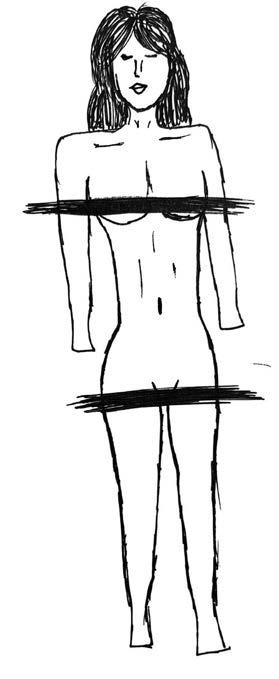
Opinion
On 19th May 2025, legislation ending no-grounds evictions came into effect in NSW. Instead, a landlord seeking to evict a tenant would have to do so under ‘reasonable grounds’ accompanied with conditions and evidence requirements. This came after decades of campaigning, inside and outside of the Labor Party, a parliamentary inquiry, and culminated in the Residential Tenancies Amendment Bill 2024 finally being passed in October 2024.
Under this new system, landlords seeking to evict tenants on the grounds of significant renovation or repair had to provide both a written statement and a piece of evidence, such as a contract or quote from a tradesperson, to show that they had a genuine intent to renovate or repair the premises.
On 20th June, barely a month after the legislation came into effect, the NSW Government quietly passed the Residential Tenancies Amendment (Termination Notice for Significant Renovations or Repairs) Regulation 2025 without public consultation. The amendment relaxed the evidence requirements for significant renovation or repair. Now, landlords are only required to provide a written statement of their intent to renovate.
30 organisations signed a joint statement slamming the changes and calling on the government to reinstate the evidence requirements and engage in proper consultation before future changes to tenancy laws are made.
In response, Anoulack Chanthivong, Minister for Better Regulation and Fair Trading, simply stated that the changes were “minor”.
It is all the more ridiculous that it was the NSW Liberals that moved a disallowance motion on 6th
So a guy walks into an imaginary bar and he’s all nonchalant and cool and eyes me, sitting in the corner sucking the flesh off an imaginary lime wedge. The thing is I can see right through him, and I know he’s the joking type because, well, frankly, I’m writing him. I digress… I know exactly what he’s gonna say before he says it. This guy approaches me and asks me what I presume to be a bad knock knock joke. I am correct.
“Do you know why blow up dolls are so expensive?”
I entertain him. “Why?”
“Because of inflation! Haha. Do you get it? Haha.”
Yeah, I tell him. I get it. I think I’ve heard it before though. This dampens his confidence, so he checks his iPhone under the bar to scroll to the next google result for sex doll puns.
I’m sitting thinking this guy walks into a bar joke is going on for quite some time, when I realise it’s not really a joke at all but something far more abstract and curious. Something that sounds very similar to a phenomenon but is far closer to a superlative norm
Because somewhere between the speed of this guy’s fingers typing blow… up… doll… jokes and my ordering of another drink this figurative doll has completely changed shape. No longer is she of the blow-up kind — an archaic contraption — but now made of velvet-grade silicone. She is fitted with mechanisms that give her an artificial pulse: a device fitted in her chest to make her ribcage rise and fall to take in oxygen her imaginary lungs do not need.
In fact, in low-lighting the doll doesn’t even appear to have a mouth. Nor limbs. She is the torso… compact and slight, but if this still isn’t convenient enough, she also can transform herself into an easy, travel efficient pocket of sorts. She doesn’t even have to have a vulva — she can be just the hole, black hole, worm hole, traversing through time and space to meet you at the crux of your orgasm. Nice.
Was it good for you?
This is a world in which hyper-realistic and largely hetero-normative anthropomorphic sex toys live in symbiosis with the dehumanisation of the feminine body. It is perhaps no real dystopia and no real trade secret, for everybody knows that it is sex, not love, that sells. So if humanity exists as
Renters Screwed, Again
August. The motion was supported by the Greens and other members of the crossbench.
It’s clear that the Liberals are no friends of renters.
This was hammered in by Minister Chanthivong, who labelled the move as a “disingenuous, politically opportunistic disallowance motion”. He continued citing the “significant fines for providing false or misleading documents” and the “$8.4 million [allocated] to the Rental Taskforce”.
This point was also echoed by Greens Member for Newtown and Greens spokesperson for Housing and Homelessness Jenny Leong. Leong stated while “the Opposition is no friend of renters, the New South Wales Labor Government has failed — as the Minister just did in his 10-minute speech — to give an explanation for the change to the regulations”.
Matt Cross, Liberal Member for Manly, criticised the changes, quoting Labor for Ending Homelessness, a Labor internal campaign group.
Independent Member for Sydney Alex Greenwich, also joined in speaking and voting for the disallowance motion stating “Providing evidence of planned building work was not an onerous obligation and provided an important protection against ‘renovictions’”.
The absurdity is that we are in this situation to begin with. That a NSW Labor Government would undermine decades of work in ending no-grounds evictions and then get wedged by the Liberals.
There are legislated penalties for landlords evicting
tenants on false grounds. There are avenues of recourse such as the NSW Civil and Administrative Tribunal (NCAT).
However, Alan Morris and Chris Martin, both researchers in public policy and housing, writing for The Conversation, warn that the NCAT has no scope to “decline to terminate a tenancy because of hardship and other circumstances” and can only decline a termination if the eviction was motivated by retaliation.
My conversations with fellow students, rental advocates, and those who’ve campaigned within Labor on this issue, reflect, beyond a sense of disappointment, betrayal.
The lack of consultation the Government undertook, as reported by tenancy advocacy groups, legal services, and the Opposition’s housing spokesperson property groups, damages the trust of the public and renters towards the government.
I do not suggest that the Government has not undertaken work or to minimise the significance of the reforms that have ended no-grounds evictions. However, in choosing to pass these damaging regulatory amendments behind closed doors, they have sent a deeply concerning signal to renters.
The Minister suggested in the debate that the movers and supporters of the disallowance motion have ascribed malice to every landlord. However, renters are not the ones that have the power; it is landlords that can decide whether or not a tenant is entitled to a shelter over their head.
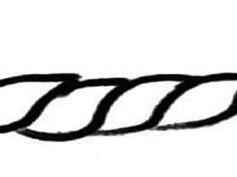

this clump of hypersexuality that intersects with technological convenience, then I ask this: why are there no male sex dolls? And if there are, why do we never hear of them surpassing the novelty of a hens night or a slumber party giggle? Where is the RoboBoyfriend to fill the every desire? Is he equipped to kiss one’s forehead and rub one’s shoulders? Is he programmed with aftercare and an argumentative streak?
Perhaps it’s a simple formula of physicality. A formula that retains the masculine body to a definitive semiotic of normalcy.
Man (the masculine form) = the capital + the norm… a standardised body both politically and sexually.
Woman (the feminine form) = the other + abject… therefore something to be obtained, something to own.
Why, then, would we create a sex doll out of a standardised structure? Is there room for such a market? In fact, if one Googles why are there no male sex dolls one can find whole databases dedicated to confirming the fact that the market for such a product simply does not exist amongst

women. Why? Because, as women, we are emotional and empathetic creatures. We attach ourselves to sexual partners, and we have an innate desire to create meaningful relationships. Too emotionally disillusioned for a silicone mannequin with a dildo sticky-taped to the pelvis. We’re from Venus…. men are from Mars. Yawn.
If this is the case, then why is it the men who develop rigorous, emotionally intense relationships with these dolls? Men who marry them? Men who depict their relationship as easier than being with a real woman? Men who own multiple of these dolls? Men who introduce their family to their doll? Men who sit down to dinner with their doll? Abuse these dolls? Men who buy dolls that resemble children in order to refrain from seeking out real children? If it is women who seek to own emotionally invested relationships, then it is the men who seek to own the woman.
It’s a double entendre. If a woman is threatened by something — namely any kind of product — it will still be made. If a man feels threatened by something that exists within his own culture… that product has a very slim chance of being made. Perhaps it’s more than just a question of capital and market and sex, and more of a question of consumerism and ownership. For is it not a disheartening universal experience to date somebody who is threatened by the sheer power of the colloquial vibrator? A fleshy masculinity so fragile that it turns to gelatinous inferiority to the technological and convenient
Help! I’ve Been Ragebaited by a Public Broadcaster
The other night before I went out I watched SBS’ new Youtube offering: a panel ‘debate’ on ‘masculinity’. Within the first four seconds, a former reality TV star said “we need to pull back a little bit on this over-feminisation of the world.” The next few minutes saw two of the allmale panellists pontificating on women’s body counts, with obvious dogwhistles to manosphere politics. I’d been ragebaited by a public broadcaster.
It’s a sign of the times that our public broadcasters are resorting to panel videos legitimising right wing views for clickable content. As a young woman, I think it’s a misuse of taxpayer funds and a very dangerous road.
The video in question was another of SBS The Feed’s Youtube ‘debates’. The Feed’s purported goals — “inspiring documentaries, hard-hitting investigations and razor-sharp satire” — were woefully unmet. From the outset, the producer’s voiceover gave us an indication of what lies ahead: “the views shared here aren’t those of SBS but they are claims and opinions being debated online.” This indicated The Feed’s logical fallacies. Everything is “debated online,” and their promotion of such opinions contributes to the problem.
The Feed’s ‘debate’ included “some of the prominent voices online.” These six men’s credentials to speak about masculinity ranged from advocacy (Tarang Chawla is an advocate against men’s violence and Mitch Wallis is a mental health speaker) to participation in reality TV (a shining realm of masculinity).
This article need not repeat what was said, but just know it included spurious value-based comments about ‘purity’, ‘feminism’, ‘over-feminisation’, body counts, and so on.
This was obviously no ‘debate’. There was no statistical or intellectual rigour. Such videos give equal weight to ideas

presence of the pleasure machine? We do not have male sex dolls, because the masculine capital does not want us to have them. And what’s more, they do not want to see themselves dismembered, disembodied: flesh turning to silicone, adams apple fitted with a voice-box speaker to whisper the sweet nothings we are dying to hear. The moan of the machine.
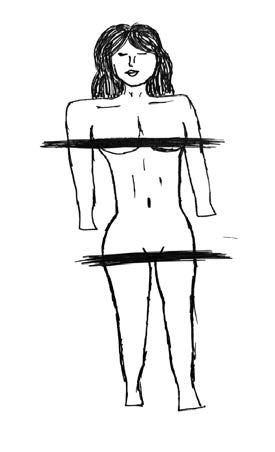
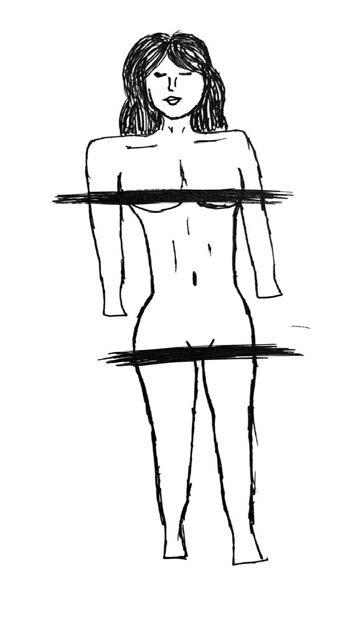
that should not be held equal, and force the other men to have to dismantle the misogynists’ rhetoric in a video framework designed to goad their views.
There were few constructive points reached, and those that were have been overshadowed by the virulent misogyny of the first half. There’s no ‘understanding’ to be reached or commonalities to be found between people who genuinely believe women’s body count matters and those who don’t.
I don’t blame The Feed for attempting to tackle the problems of Australian masculinity. I do, however, resent their approach.
Youtube’s algorithms promote radicalisation and bolster the right-wing pipeline. Many men I know attribute their ‘right wing phases’ to this platform, sublimating them in ideology that would not have come across otherwise. The Feed’s video then comes across as an ill-conceived, poorly executed attempt at garnering views.
Since, a few participants have spoken about the experience and its emotional burden. In a statement to news.com. au, Chawla stated his aim in appearing in this video was “to discuss the realities of masculinity because my sister, Nikita, was murdered by her partner and too many men still don’t take that seriously”. On his Instagram story, Chawla later expressed his dismay and frustration at the other participants, but regarded the debate necessary to stop these ideas just “lurking in the shadows”.
It begs the question as to why SBS did make (and publish) this video? The answer lies squarely on our Youtube explore pages: the wild success of American media
company Jubilee’s ‘debate’ style videos. These are not debates, but a satirical facade of one. These videos falsely position two different groups as ‘equals’ for ‘balance’, often with the oppressed group arguing for their own humanity. And yet they are endlessly clickable.
Jubilee describes themselves as the ‘‘Disney’ of empathy’, nicely admitting to their own commodification of human qualities. Their videos, in their pretence of ‘honest’ panels, provide a legitimate space for their dangerous guests to air their right wing views. In using the term ‘debate’, they construct an arena in which the thoughts shared are merely ‘in contest’. But misogyny is not an idea competitive with another: it is something that has no place in modern Australia.
Every woman I know understands misogyny and is forced to be empathetic towards men uncovering a new form of masculinity. For us, it’s life and death. For male audiences, I daresay this video would not be helpful. Real life conversations are.
Unlike Jubilee, SBS does not run to an overt profit incentive. I hope then, that they are driven to provide actual content, instead of commodified slop. If they need any ideas, talk to Chawla and Kissubi”, they clearly know what they are doing.
Addressing the rot should not be promoting the rot. This video was a spectacle of debate rather than an actual one. These ideas should be dismantled, in private. No kind of showmanship amongst a white studio background will help educate young Australians.
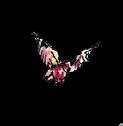
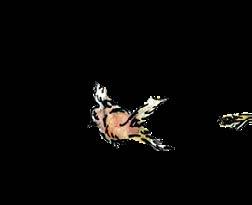
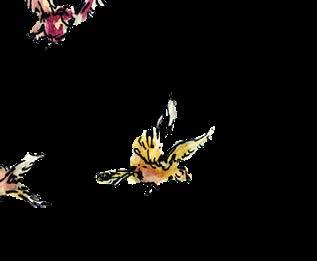

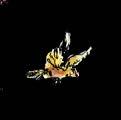

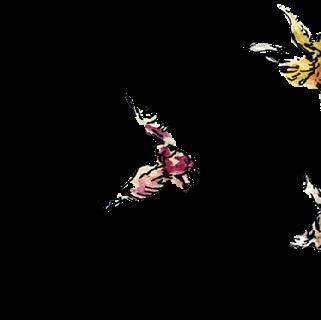



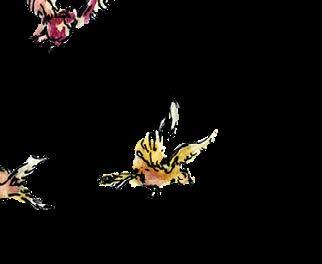



It is the Performative Male Epidemic & I am on Palliative Care
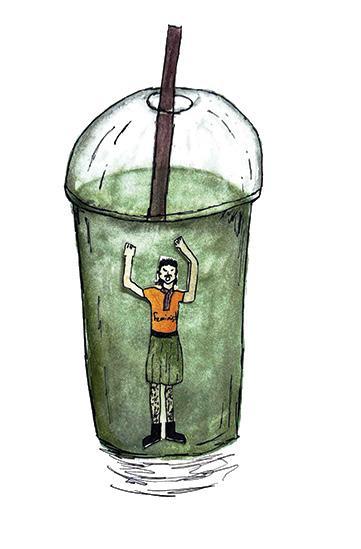


Opinion

kitsch, banal, and so on. Take ‘Normal People’ out of the tote bag, out of the Hinge profile, and put it on the bookshelf.
I don’t think that is all that is at play, however. The real question is: why do we care about performative men? Who is really that much of a hater?
I think that deep down, but more honestly, barely below the surface, something about the unbearable fauxness of these performative men makes us feel better about our own identity, and our own performance. The transparency of the performance is oddly grating. The use of interests and traits as psychosexual commodities and signals in such an overt manner seems like it must be ironic, but in fact it’s sincere, and somehow that makes it worse.
The obviousness of their performance gives us a mechanism to sublate our own fears around performativity, to convince oneself myself that I am 100%-genuine-bonafide-authentically-really-really-real, that I am I.
Baudrillard writes similarly on one of the few things more grotesque than the aforementioned — Disneyland. He describes it as a “deep-frozen infantile world … embalmed and pacified”. I have never been, but I must confess he is not the best spokesperson. He theorizes that Disneyland is presented as so overtly fictitious only “in order to make us believe that the rest is real”, in order to convince us that all the childishness and commodity and so on is inside
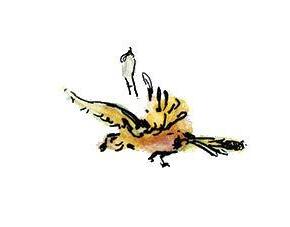




those pearlescent gates, when in actuality the gate is wide open and not a gate whatsoever, and the world in and outside of Disneyland are simulacra, empty of meaning.
Disneyland exists to convince us that the real is still out there somewhere. These men, I think, are our Disneyland. We talk about them in order to construct a barrier that separates authenticity and performance, but the barrier is just pretend, just a performance.
What separates me, truly, from the monstrouslyincestuous autosexual spawn of Pinterest boards that wear man-shaped suits?
Nothing at all. So what do people mock when they mock performative men? It can’t be the performance — that would hit a little too close to home. Performative men aren’t mocked for being performative, they are mocked for not performing in the right way. They simply aren’t very good at it; too sincere in their psychosexual signalling, on the wrong side of the peacock-sexpest spectrum, too overt in their desire. All in all, there is not enough shame. How sad is it to laugh at that to feel better about yourself?
In truth, it is impossible to do anything but perform.
The other night I read or dreamt of two birds. One was singing, one was silent.
And they were both in cages.
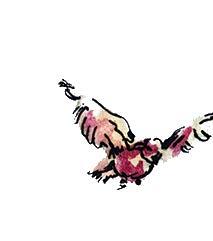
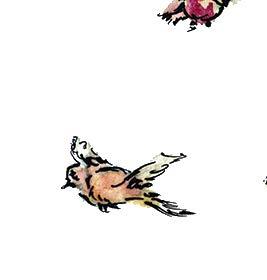
From Loneliness, Towards Community
It seems that the male loneliness epidemic is alive and flourishing, as it always has been. I have not met a man yet, good-hearted or not, who has not felt its effect, or a woman who has not been hurt by a lonely man. How far back does this loneliness go? Where did it start, and when will it end? How many lives could have been saved had this been stopped before it began?
The truth is, there is little data to indicate that men are lonelier than women. Research from the Australian Institute of Health and Welfare (AIHW) suggests that men and women of all age ranges experience similar levels of loneliness. However, the same dataset recognises that men experience more social isolation than women, that is, having “objectively few social relationships or roles and infrequent social contact”. This isn’t an ‘I told you so’ moment about the existence of the male loneliness epidemic; it is a moment to recognise that men have fallen behind on the community hamster wheel and it is hurting all of us. Men might not be statistically lonelier than women, but there are layers to the socialisation which have led us to the stage we are at now. Men are not equipped with the same skills that women are, which do in fact make it harder for them to seek out help, maintain deep relationships, and build communities.
The online incel ‘community’ has pushed a far-right agenda which is violent, misogynistic, and, altogether, gross. It is a movement which encourages the dehumanisation and assault of women, founded upon the baseless opinion that men are superior to women. It is made up of men who feel as though they have been rejected from society by women due to their attractiveness or financial status, creating a ‘community’ based upon hatred and a perverse desire for power. They conflate loneliness with a lack of romantic validation from women, indicating the very problem of the manosphere: placing the value of romantic and sexual relationships above all others, and blaming women when they are lonely as a result of their lack of social connections.
However, if we step back and take in the real-world picture, we can see how loneliness in men infects even the best of them. It is quieter than the internet buzz. It can be found in the fathers who eat alone at the dining table, the men who develop dementia from a lack of community involvement, the boyfriends who do not know how to be vulnerable. It is in every male friend group who can share passionate conversation about their favourite video games but go silent when they are struggling. It is in the men who rely on their
female partners for emotional support, who get surprised that a relationship can actually go deeper than the surface because they haven’t experienced that before.
A well known statistic, provided by Beyond Blue, is that of the nine people who die by suicide every day in Australia, seven of them are men. This is further cemented by the fact that only 37 per cent of men and boys reach out for support when they need it. In the worst of men, loneliness feeds into violence; they choose to punch in walls, become emotionally avoidant, and hurt the people around them. But where does this start? Who’s to blame?
As with everything else, the male loneliness epidemic is a consequence of the patriarchy, a system created by men to benefit men. It is inherently rooted in misogyny, leeching off the idea that femininity is subservient and inferior, that masculinity cannot be soft or loving. The idea that emotions, vulnerability, or empathy makes someone ‘less of a man’ is not only damaging, but limiting to the vastness of relationships men could have. The worst of men knowingly feed into this narrative, encouraging the dehumanisation of women further. The best of them, the well-intentioned and self-aware types, still carry the deep conditioning that they inherited from their childhood, doing damage to themselves and the people who care about them.
We are old enough now to understand that this system benefits no one, that the socialisation of both girls and boys has been an abusive cycle to keep everyone in line with the demands of our patriarchal, capitalistic society. It hurts everyone for the sake of power and for the sake of profit.
We have turned our girls into emotional incubators and our boys into invulnerable workhorses.
Since childhood, girls have been socialised to create and cultivate community; women do not pop out of the womb with the skill of maintaining deep, meaningful relationships. We were taught the skills of nurturing, of handling our emotions, of sacrifice from a














The Lingering Absence
Zoe
Gelagin can’t seem to forget that she’s a woman.
A common side effect of undertaking an Arts degree is reading texts that are philosophical in nature. Essays older than indoor plumbing, than USyd, than the loom. It’s expected of me to pore through the pages, digesting the often outdated language in order to reach the central thesis — usually a point on freedom, creativity, or the rights of man. No matter how many times I read these early works, I still find myself hung up on a certain thing.
The rights of man? Of man?
It’s only ever a brief moment. A scrunch of discomfort. My eyes catch on the three-letter word as my brain ticks over. Of course this author discusses only men. It’s logical for this author to refer to the reader as a “he”. It makes sense that I am not the intended audience of this work. The omission of women is almost never a reflection of the validity of a text, nor its attitude towards us, but of the culture and linguistic conventions

I’ve come to accept that the world I live in was first designed for men, before adding women as an afterthought.
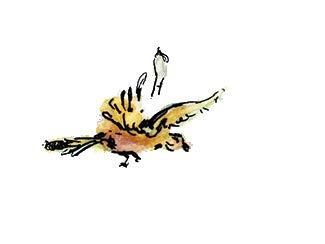
It’s still not a pleasant marker to come across while sitting at Courtyard Cafe trying to do my readings. A reminder that the presence of women in academic conversations is new. That in the scheme of history, my being able to read the ideas in front of me, let alone process and understand them, is the exception, not the rule. Through a million little hints, I’ve come to accept that the world I live in was first designed for men, before adding women as an afterthought. The issue isn’t that there isn’t a place for us now (although that is still often the case), but is instead the incessant reminder that follows wherever a woman goes.
“You haven’t always been here.”
With the utmost respect for the men in my life, I’m not sure they quite grasp how often this realisation occurs. Walking down Eastern Avenue will quickly demonstrate that the university frequently names buildings after notable individuals in its history. I was able to find thirty-three such examples, of which only four buildings — Jane Foss Russell, Margaret Tefler, Belinda Hutchinson, and Susan Wakil Health — are named after women. Of course, this is (hopefully) not because of sexist university naming conventions, but because women have historically been unable to climb university ranks. Or, if
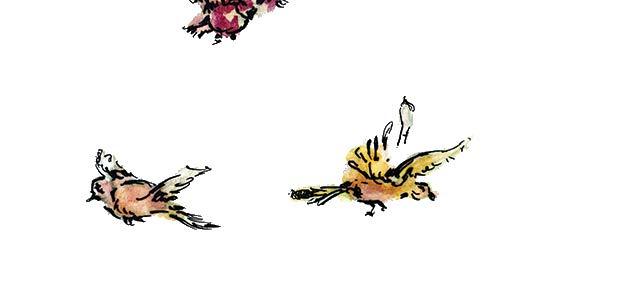
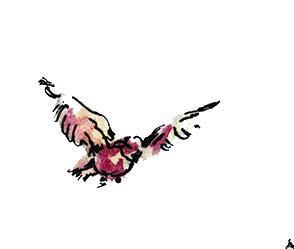
young age. This has always been to the benefit of men and to the detriment of women; we were brought up to be the wives and mothers to the men who benefited from not having to carry social responsibility. I remember when I was young, at dinner parties the girls would be taught how to plate food nicely, carrying trays of tea to guests, and make small talk as they served the uncles, while the boys sat on their phones in silence. It was a curse and a blessing; the unbearable weight of social expectations that ended up equipping us women with the necessary life skills required to live a fulfilling life. It benefited the boys in the short term; they were exempt from social responsibility, were encouraged to be hyper-independent, and continue to benefit from their emotional needs being met in their romantic relationships without understanding the effort involved. However, now as women begin to prioritise themselves and their female friendships over romantic connections, the emotional gap between men and women is made more apparent.
Now we have men who do not see the value of community, nor do they have the skills to uphold one, and they are suffering as a result. Men are not necessarily ‘suffering in silence’; they just do not have the words to express their suffering — assuming that this is just inherent common sense is a discredit to the mental and emotional work it takes to actually heal from the lessons we were taught in our childhood, to actually grow out of the roles we were prescribed to.
Boys are encouraged to be ‘less emotional’ for the fear that vulnerability is synonymous with the tragedy of being feminine.
Instead, many men are socialised to prioritise “strength, independence, and stoicism”, leading them to lack the skills that are required to actually develop meaningful connections with people. The shame, ridicule, and intolerance for emotions that stems from childhood teachings and then festers further in male friendships is a toxic cycle that needs to be unlearned. Men are not lonely because they are being rejected by women, but because they crave deeper social connections, with friends, with family, with broader society.



I wanted to see the fixture of the women’s AFL season, I’d type just that into Google. Were I looking for the men’s, however, I wouldn’t need to qualify what gender I meant: men’s AFL is just “AFL”. The English language is littered with holdovers from eras gone by, not always harmful in themselves, but indicative of how we view men as the default.
To describe these facets of the English language as acts of sexism might be unfair; they feel more like the footprints of a misogynistic history, stretch marks left in a society forced to make room for women too late. Still, they serve as unwanted reminders of the struggle. Certainly, it’s important that we keep history in the forefront of our minds, and recognise how far we’ve come and how far we’ve yet to go, but it feels that this memory falls disproportionately upon women. I am a proud “angry feminist” who takes great pleasure in calling out behaviour that is not conducive to an equitable society. But sometimes, even I don’t want to be faced with the uncomfortable history that surrounds me. I just want to walk around campus, watch the footy, or do my readings. To forget that society was predicated upon sexism is a privilege, one that women are often not afforded.
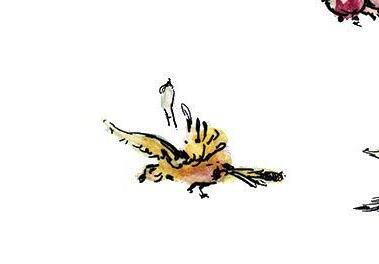

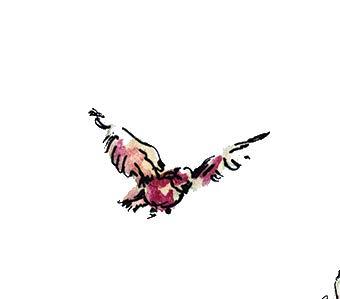
It is a disservice to men to suggest that they are not capable of empathy, care, or nurturing. It is a disservice to women to suggest that these skills are inherited through biology, rather than hard work and generations of teachings and learning.
We know how to build community because we have a lifetimes-worth legacy and responsibility to build community; we have been given the burden and the opportunity to hold our softness in our palms and offer it up.
Recognising that our characteristics are not inherently biological, but rather assigned at birth by virtue of gender will allow for a society where men are actually encouraged to be soft, to be vulnerable, and to ask for help when they need, allowing them to not only live fulfilling, emotionally rich lives, but to also offer up that care to the people around them. The male loneliness epidemic is not the woman’s responsibility to solve. In fact, the only way to move forward is for men to band together, begin to have conversations that go beyond the surface, and challenge their thinking to allow for vulnerability. It is on men to build a community which is not founded on hatred, violence, or toxic ideas of masculinity, but, rather, by redefining masculinity and masculine friendship to include softness and openness, unlearning our misogynistic thinking, and learning from the original bearers of community, women.
Dear Men, Please Read Books
We are all reading less. This is an obvious fact. If you don’t believe me here is a graph from the ABS:
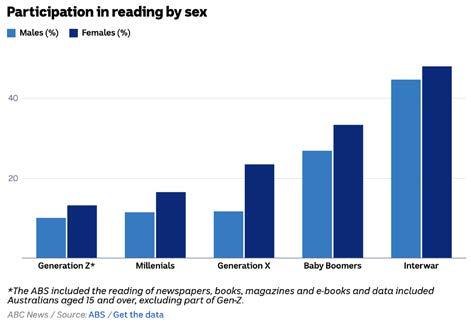
Not only do men read less, but they also read less fiction. Why is this? Does it matter? And what can we do about it?
There is a good deal of hypothesis on why we read less. Is it parents, consumed by the exhausting workforce, who cannot read to their children and pass on the value and skill of sitting with focus and serenity to read? Is it the adjective ‘frivolous’, which seems to be subconsciously attached to the act of reading, reinforcing that if it is not making you money or helping you climb social ranks then it is a waste of time? Or is it the instantaneous gratification of social media, content that is void of a deep cognitive state of feeling, a device that relies on our mass numb addiction?
Perhaps it is a combination of all these factors. But men. Oh men! I can’t seem to articulate the specific aroma that lingers on literature that only men can smell as a deterrent. Are books really that intimidating?
Let me debunk two popular scapegoats that we use to pardon the lack of participation in fiction.
“Men aren’t reflected in literature nowadays”, is not only a pathetic excuse, it is also just not true. I refuse the notion that men aren’t represented in literature; four out of the five most recent Booker Prize winners have been male authors writing about the male experience. It is quite ironic how the history of literature is predominantly malecentric yet there is still a shameful stigma for men to engage with stories.
A quick google search of “greatest writers of all time” has 51 writers come up. Six are women. It should come as a surprise that men won’t engage with a literary history that bolsters their experiences and identity. Poetry is slammed as a feminine medium while paradoxically Shakespeare, Tennyson, and Keats dominate the form. Yet, men also aren’t afraid to defend these titles. Perhaps it’s less to do with representation and more to do with the stigma of literature as a whole.
As a second excuse, I am hesitant to accept the idea that “reading is a waste of time”. I must’ve missed the ‘annual male meeting’ where we concluded
Michael Krizan wants men to read.
that extended periods of focus, concentration, and contemplation are emasculating. Instead, men have been told their worth is measurable in creatine powder scoops and a hustler mindset. “Reading books is for losers who are afraid to learn from life.” That, unfortunately, is a quote from Andrew Tate, someone I’m hesitant to bring up because in my consciousness he doesn’t really exist as an entity, but for many men is sacrosanct. It’s the idea that life is a competition, and you need to lose to feel grief, hurt to understand pain, and succeed to feel happy. This rhetoric is nothing but an excuse for men not to engage with the experiences of minorities. It solidifies the myth that those around them don’t have depth.
Reading, then, is a crucial destabilising force feared by male powerbrokers because it gives us the playground to explore our emotional range and apply that to the communities and friends around us. On this note, myths debunked, let us discuss what we know to be true about this crisis.
“The great novels are education of your feelings, of your sympathies — they enlarge your sympathies. The older we get the more we rely on rote responses, but fiction is like an axe, it cuts all through that and opens you to things we should care about.”
Susan Sontag
The only thing I am certain of is that men seem to be pulling a veil over their own eyes. They refuse to engage with narratives that confront their bias, narratives where they lack power, are the antagonists, or are represented against the binary, or, godforbid, forced into the shoes of women, gays, and other communities. To immerse yourself into the unknown, to form opinions, have them change during reading, and to feel a connection to a work is scary. If men remain incapable of critically engaging with emotional thoughts then machoism, and influencers like Tate, have won. This forces men to seek other vices, whether it be gaming, work, relationships — things that sidestep the truly rewarding aspects of humanity, the emotional thrill, love, and devastation that we can only get from our art of storytelling.
No matter what the reasons are for the decreasing rate of male fiction readers, I do not want to hear men complain about loneliness or mental health when they haven’t attempted to sacrifice their ego and step into someone else’s shoes for at least 50 pages.
Reading for men generally seems to fall into two categories; the first is a performance, to post your copy of bell hooks online, to have The Bell Jar in your tote at all times, and to hold a dust collecting copy of Infinite Jest on your bookshelf in the back of Zoom calls. Men in this category understand the
cultural signifier of reading as a status symbol, but they are too tightly wrapped in a performance of nonchalance to emotionally engage with the depth of these texts.
The second category is viewing reading as an equation. Much of what men value in themselves, and each other, seems to be quantifiable. Height, alcohol tolerance, goal difference, fantasy football teams, kill to death ratio on Fortnite: these are all measurable. Fiction importantly breaks this. It is a stark reminder that men are multi-dimensional emotional beings. Bizarrely, men insist on locking themselves into emotional jail cells where they argue over cock sizes and their masculinity, as if comparing the size of the bars on your jail cell to the next inmate will alleviate your emotional perplexity.
I beg you to shred your copy of Atomic Habits, put down Jordan Peterson’s 12 Rules for Life, and save The 48 Laws of Power as firewood. You’re not a self-improvement project. You can’t maximise your potential by supplementing these rules into your life like they are some program or code. Life cannot be explained this way, nor does it deserve to be lived this way.
I don’t want to sound like a beggar, but the richest parts of our lives aren’t when we are practical or productive. It is when we are in the trenches of feeling and action — an aspect of our humanity that only storytelling and reading can help us enhance and understand.
There seem to be probable solutions to this crisis, such as better male role models that advocate for reading, fostering reading for boys from a young age, and building community around books. But even as individuals we should encourage and challenge men to join us in discussions and new journeys that ultimately bridges stronger connections. We need less boyfriends in shocked disarray, unable to comfort their partner when they open up emotionally, and more men willing to engage with the myriad of experiences that make up our world.
In an age of information overload, proper knowledge and wisdom feels scarce, and we do need time for proper contemplation and engagement with ourselves as emotional beings, not capitalist products. As Susan Sontag said, “The great novels are education of your feelings, of your sympathies — they enlarge your sympathies. The older we get the more we rely on rote responses, but fiction is like an axe, it cuts all through that and opens you to things we should care about.”
Reading carries on the storytelling experience where we learn to empathise, listen and grow from each other’s experiences. We cannot derail ourselves from this. I am optimistic in the sense that men, and all of us, will begin to yearn for more than 30 second TikToks and truly want to appreciate another person’s mind, identity and experience.
Please, care about reading guys. Pick up a fucking book.















In Gaza, Men Are Made Before They Are Boys
Jaseena Al-Helo defines a zalamah.

Boyhood is a luxury. One day you are chasing a football through alleyways, the next you are carrying your brother’s body wrapped in cloth. In the West, masculinity is a punchline, a caricature of gym mirrors, clenched jaws, and the commandment that men must never cry. But under occupation, masculinity is something else entirely. To be a zalamah ( ) — a true man — is to live a life braided with tenderness and loss. It is to inherit grief as early as your first haircut. It is to be defined not by dominance, but by responsibility.
On 21st May, amidst the blockade and the slow violence of famine, Al Jazeera’s cameras captured a man, older than my own jido. His hands trembled, his eyes wet. He cried into the microphone, his voice cracking not with shame but with hunger:

Biddi khubz bas I just want bread.
Those three words. Bread as the measure of life. In the West, men are told not to cry because it makes them weak. Yet this man’s tears are testimony. His vulnerability, a weapon sharper than any sword. Masculinity here is not the suppression of need. It is the courage to name it, to beg for life, to expose the wound in front of the world
In June, while the West was posting infographics for Men’s Mental Health Month, a boy in Rafah stood among the ruins. He had just lost his mother after Israeli forces opened fire on civilians waiting for food at the al-Alam roundabout. His voice, impossibly steady for someone so young, cut through the chaos:

Quwtkom fi al-silah, quwtna fi Allah
Your strength is in weapons, our strength is in God.
He is a boy, but he speaks like a prophet. The weight of centuries sits in his throat. Where Western masculinity is inextricable from domination, this boy allows us to reimagine. His masculinity is one defined by faith, conviction — defiance without a rifle. His strength is not the power to kill, but the refusal to let his spirit be killed.
What is masculinity, then? Is it the man in the gym who struggles to say “I am hurting”? Or is it the boy in Rafah who, with dirt still in his hair, teaches us what it means to be unbreakable? The zalamah is not the man who hides his pain. The zalamah is the boy who turns grief into scripture. Into a testimony
for the world to be truth. Letting his pain pave the path that points towards the genocide of his people… to my people.
On 23rd February 2024, another video travelled the world. A man walked south through Gaza carrying a bundle over his shoulder. Inside was the body of his brother, wrapped in cloth. A journalist asked if it was heavy. He shook his head.

Mish thaqil. Hada akhuy
He is not heavy. He is my brother.
Western masculinity glorifies strength as a solitary performance, the lone man who lifts weights for himself. Here, strength is love. Here, a man is strong not because the body is light, but because the bond is unbreakable. Masculinity in Gaza is not domination but devotion.
What about the grandfathers? Khaled Nabhan, known to the world as the father of Reem, went viral when he clutched her lifeless body and whispered, “ ” (ruh al-ruh, the soul of my soul). He was a zalamah in the truest sense. He braided her hair, spun her in circles, kissed her cheeks. The West often dismisses such tenderness as feminine. But in Palestine, to be a man is to nurture. The zalamah does not fear softness; he makes it his signature.

Khaled was killed in December 2024 by an Israeli airstrike. Reem had already been killed the year before. They were each other’s favourite, bound together by love.
And then there are the men whose names the world knows. Motaz Azaiza, the young photojournalist who documented Gaza until the images themselves burned through his soul. His smile is tender, almost shy. He speaks openly of guilt, trauma, nightmares. He cries in front of cameras, yet no one doubts his strength. He is a zalamah because he dares to be human in a world that wants him dehumanised.
Beyond Gaza, his humanity reaches unexpected spaces. Appearing on the Instagram page of Miss Rachel, he defied the Western desire to paint him as a monster, one who is rough and frightening, domineering and cruel. Here Motaz embodied the meaning of a true Palestinian man, his presence nestled among nursery rhymes. Not a threat to children, but a teacher of humanity.
For so long, the West has cast our Arab men as barbaric, dangerous, oppressive. But our men are the opposite. They braid their daughters’ hair, they carry their brothers’ bodies, they cry for bread, they stand unarmed before tanks. They protect, they nurture,
they provide, they care. They are not fragments of masculinity but the whole, the all-in-one.
The zalamah is not a caricature of dominance. He is proof that true strength is tenderness, that true masculinity is the courage to be soft when the world wants you hardened.
There is… or rather — was — Anas al Sharif, another journalist, another voice for the voiceless. He grew up in front of Al Jazeera’s cameras, surviving the 2008 bombardment as a boy, only to die in 2024 as a father, husband, and reporter. People called him “our voice.” The zalamah is not only the man who provides for his own family. He is also the man who shoulders the duty of speaking for the entire nation.
What do these men teach us?
And what if we measured manhood like this? What if instead of six-pack abs and emotional suppression, we asked: who among us has the courage to cry publicly for bread? Who among us carries pain so raw it becomes a collective demand? The zalamah is not the man who withholds his tears. The zalamah is the man whose tears feed a nation.
That masculinity is not inherently toxic. It has been poisoned in the West by privilege, by power hoarded and abused, by the performance of hardness. Under occupation, masculinity is revealed in its most elemental form: care, sacrifice, resilience.
Zalamah is not a clenched fist but an open hand. Zalamah is not power over others but power for others. Zalamah is braiding your granddaughter’s hair, carrying your brother’s body, crying for bread, and speaking truth until it kills you.
In Gaza, boyhood is fleeting. Manhood comes too soon. Yet in every tear, in every whispered prayer, in every burden carried with love, we see that masculinity is not a curse. It is not the enemy.
What if the West stopped mocking men for crying, equating masculinity with violence, and insisting that tenderness belongs only to women? Perhaps we should look to Gaza, to our concept of the zalamah, to the men who have no choice but to be more than the stereotypes we inherited.
Because the men of Gaza are not weak. They are not toxic. They embody true masculinity.
And so the question is not whether masculinity is dominant, but whether we have been looking in the wrong places. After Gaza, after the picture I have painted of what we define as a zalamah… a real man, can you honestly say you understand what it means to be a man?


Culture






Which One’s the Twink?
Back in 2023, my partner and I went up to Newcastle for a week. The nightlife was a bit underwhelming so we thought it could be fun to hop on Grindr to meet some of the queerfolk in the area. We set our username to ‘Sydney Twinks’, uploaded some pics and let the horny 50-year-old men roll in. Between the sea of ‘hey…’s’ and requests for us to stomp on them tandem style, there was a large number of men sending messages like: ‘Where’s the twinks, I don’t see any twinks here’. Admittedly at the time, my partner and I didn’t have six-packs or muscles, but I’d still describe our bodies as slimmer, hairless, and in our early 20s, which on all accounts should have been three ticks for us being twinks, yet DownLowDaddy67 disagreed.
There are two types of queers: those who love being put into labelled boxes, and those who enjoy selecting ‘other’. The one thing that a portion of box queers love more than putting themselves in boxes, is gatekeeping the boxes they’ve put themselves in.
Are you really bisexual if you’ve not slept with both genders? Are people who use he/they or she/they pronouns, but only experience opposite-sex attraction part of the community? What about intersex and asexual people? Can you call yourself queer if you are ‘apolitical’?
These are all hot takes I’ve heard from within the community. They are all inherently problematic and the answer should be that if someone labels themselves as part of the LGBTQ+ community, then they are. We are not bottles of wine, we shouldn’t have to live up to made-up guidelines about how to perform queerness. With queer erasure on the rise globally, we cannot be helping the erasure ourselves.
This isn’t to say that we should get rid of boxes. I love the boxes. Boxes let me check in with people who have similar experiences to me and can understand my world better.
However, while the gay male ‘tribes’ are fun, they also introduce unnecessary stress into a community that already experiences double the amount of mental health disorders than heterosexual people experience. For the straightfolk reading, here is a quick run down of the main tribes:
Twink — Young, skinny, hairless
Bear — Older, very hairy, burly
Cub — Younger bear
Otter — Youthful, hairy, on the skinnier side
Wolf, Fox, & Silver Fox — Similar to otter but older, tends to be muscly, particularly wolf
Bunny, Bull, & Rat — Muscly, gym-bros, each is slightly different
Twunk — A muscly twink
Chub — Similar to bear but much less hairy
Now, I’ve put on some weight since 2023 and grew a beard, so my twink days are behind me. Of the 12 tribes I just listed, 7 of them have the expectation that you’ll have a six pack or are visibly muscly.
Quite frankly, how can there be three terms for ‘fitness’ gays based on their muscle level ranging from bunny to bull, then also twunk and wolf which also mean ‘muscley gay guy’, but there isn’t a mainstream tribe for guys who have a ‘dad bod’ and aren’t hairy? Especially since only 1-2 per cent of men have abs, it’s baffling, and it sets
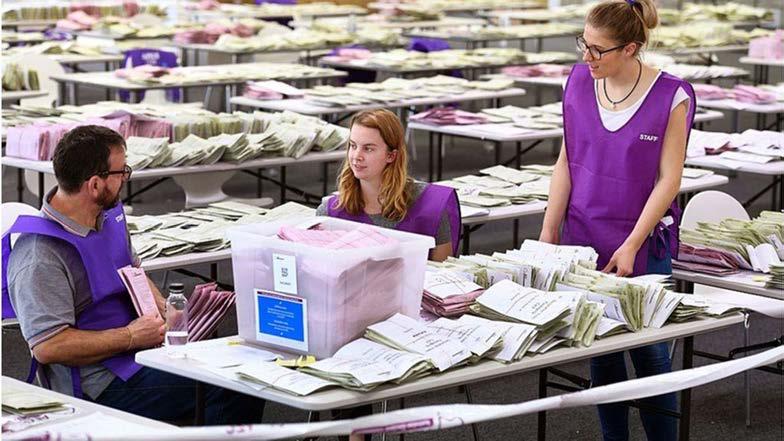


Ewan C. serves his tribe.
unhealthy expectations for the queermale community on what it means to be a gay man.
Expectations of twink as a tribe are morphing from just slim to slim and toned. Otter should be a bit more of a catch-all term, but earlier this month I referred to myself as an otter to a friend and they said to my face, “No, otters have to be slim.” Then there is a massive jump between otter and bear, with a lot of the community also gatekeeping how big you have to be before you can call yourself a bear.
Which leaves cub: a transition between twink and otter, to bear. While the term is used less than the others, it catches many men and implies that their destiny is ultimately ‘bear.’ This is scary when you’ve spent the rest of your time in queer spheres being told that being a twink is the ideal, and what’s required to be a bear is the opposite of that.
While there are other tribes based on interests and kinks like leather daddy, drag queens, gaymers, circuit gays, and pups, you’re required to enjoy one of those things. Similarly there’s the ambiguous ‘masc’ or ‘femme,’ but these don’t have any personality to them: the list of tribes needs to expand and update to match the current population of queers.
The bougie north shore gays can be peacocks, the ‘tawxic in a hot way’ gays can be pythons, the old men that send unsolicited nudes can be sphinx cats. Better yet, we should just let people go nuts and choose whatever animal they vibe with most. Telling me you’ve got raccoon vibes, says so much more than being a twunk.
Oh wait. Did I just create Fursonas? I hope DownLowDaddy64 would be proud.
University of Sydney SRC is hiring casual polling booth attendants to administer its Annual Elections and count the votes. The elections run 23–25 September 2025 and counting continues for up to two weeks afterwards.










Comedy
Godhead
Louis Friend fucks.
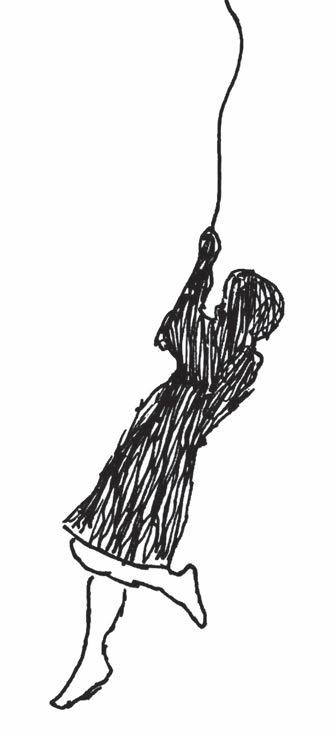
Jessica Louise Smith defemds the femcels.
Addressing the
‘Femcel’ Allegations
Who is responsible for my celibacy? On a monthly basis, right around our synced ovulations, my girls and I ponder over this quandary, searching for answers in history’s great philosophers. I argue with Aristotle over eudaimonia. I am pacified by Plato’s perfunctory Theory of Forms. I ask Kant what the hell is wrong with my Kant!? None of these “mighty men” can give me an answer to my question… of course they can’t! Good-for-nothing-sons-of-bitches.
My name is Jessica Louise Smith, and I am a femcel.
See, from my fruitless interactions with some of the ‘greatest male minds’ of this timeline, I gleaned their inability to answer me came from a deep down shame. Guilt. Classic male ego. It’s not my fault I’m celibate… it’s theirs.
There are many misconceptions about my lifestyle, with propaganda circulating through the mainstream, headlines throwing around jargon like virgin, man-hater, and loser. Two truths and a lie. What people don’t understand is that my condition, though boasting a pool of hatred and spite, does not come without desire — a catch-22 of… above-average size.
The constant failings of the male population in this androcentric world make for baron plains. Evolutionary-speaking, it is highly likely the female species will soon have more in common with a yeast infection than the homo erectus, recent findings showing a genetic shift towards asexual reproduction.
I’m often asked if my rejection of the male species has led to feelings of loneliness. Um… I don’t know? Is my mother an alcoholic? No, only on cold winter nights, when she’s all alone (because her good-for-nothing husband is up at the bowlo with a couple of the emotionally-divorced fathers from the primary school) and rewatching Notting Hill realising she’ll never get to be a girl standing in front of a boy asking him to love her. No further questions.
Even now, when I close my eyes, the film starts back up. Rain-slick Berlin streets, a train accelerating into the distance. Hairy, muscled men dancing naked in dim light; someone’s talking to me, asking where I’m from, as he slowly pulls my cock. Then the goosebumps start and my eyes begin to roll. I’m on a couch in the back with an Irish daddy, he’s showing me the tattoos on his big forearms and he’s telling me they’re gonna get the six counties back. Then I’m on my back, and there’s hung twinks curling around us like snakes; and daddy’s telling me that he doesn’t like to share his food.
Certain things take me back to that night, to that feeling. Hard, dark techno; getting ready for a house party; stepping out into the winter night when you have decided, as always, to wear a fur coat and nothing else. It’s the feeling of putting a pill on your tongue, knowing
something is coming but not knowing whether you are ready for it. You roll the dice anyway. Young and dangerous, you think that you’ve already won.
For example: in Edinburgh, I tire of my mother and her friends and catch a flight to Tiree with a man
I met the night before. I blink and I am lying naked staring at pastel yellow wallpaper. After the flight on the six-seater, after the swim in the ice-cold sea, he fucks me in a weather-beaten shack at the end of the world. Lying there, I experience a moment of such exquisite bliss that it makes every other bad bet worthwhile.
“You get…”
“No, you can’t smoke that in here” says Janice, my mother’s tiresome friend.
“Whatever,” I continue, ashing the cigarette. “You get three questions. And you only get yes or no.”
“Oh no, no, no,” says Janice, excited now. “You must tell us everything. Was it someone from the Star Bar?”
I have no idea what the Star Bar is: I have never been there and do not intend to. Even the name
sounds naff. No, I had met the man on Grindr, of course. These old fools.
“Yes” I say, “Yes that’s right, I met him at the Star Bar…”
For a while, when I get back to Oz, I play the reformed young man. I delete all the apps and get involved with a strange Christian contingent in the law faculty. But the closest I get to god is in the Vic Park showers with my Statue of David dick out. Pretty soon I am back on Oxford St, in hell.
The music is unspeakable and the boys smell like milk. They tell me about their News Corp jobs and office gossip, and I just want my brain out on the floor already.
There is only one thing I want to know from them. In fact it’s the one thing everybody wants to know:
IsitBig?

President
Angus Fisher
The semester is back in full swing, so why not stop by and read my President’s report?
The Fair Fares campaign to get concession Opal Cards for International and Part-time students continues to gain steam. We’ve reached out to Unions NSW to canvas their support, and they’re completely on board. I think the labour movement should play an important role in the campaign. Not only do I think it’s unjust to make international students pay extra despite their contributions to NSW, but it’s also a workers’ issue. International students often rely on casual work to cover their expensive day-to-day costs, and subsidised transport will help them get to work. I have a meeting with representatives from Unions NSW next week, so I will let you know how that goes. I’m looking to get the support of as many unions as possible. Please sign the petition if you haven’t already!
bit.ly/41ovF3P
In the background with members of the SRC Exec, I have been working on renewing and hence renegotiating the SRC enterprise agreement. This was a job that former SRC Presidents neglected and allowed the EBA to be multiple years overdue, but I am finally dealing with it. The new agreement will hopefully mean more satisfied staff who will be better able to do the invaluable work of supporting undergraduate students from improved working conditions.
Finally, a reminder that on Thursday at 3pm, there is a referendum for Palestine at the quad lawns. I will be working with the university to ensure this important event can occur as envisioned. I implore everyone to come along and vote on the motions to censure the Australian government for its complicity in the genocide in Gaza and call on our universities to break ties with weapons companies.
In solidarity, Angus
General Secretary
Grace Street, Anu Ujin-Khulan
Last week was our pilot, (re) introduced version of “SRC Week” which was to be a week of events, stalls, and workshops led by the SRC as a precursor to Radical Education Week (coming up in Week 5!) and as another project to increase the reach and visibility of the SRC. Unfortunately, lots has changed since the SRC set up a marquee for events on Eastern Avenue - namely the university booking system, suppliers, and climate crisis-induced rain and wind. Nonetheless, we had some great events and stalling to promote the National Referendum on Palestine this week, talk about placement poverty and renters’ rights, and much more. Check out the @src.week.rad.ed.usyd instagram account to see what we got up to!
Anu led a panel on the cost of living at the International Student Collective event for SRC Week, with MP Jenny Leong and representatives from the Sydney University International House Alumni Association (SUIHAA) to talk about the campaigns to reopen International House and legislate Concession Opal Cards for international and part-time domestic students.
Keep an eye out for: the National Referendum on Palestine this Thursday at 3pm, Radical Education Week from 3-5 August, and (hopefully) International House and Concession Opal Card stickers and merch!
Education Officers
Luke Mešterović, Jasmine Al Rawi
Hello again! It’s only Week 4 but your Education Officers have hit the ground running and been hard at work. We’ve been dedicated to building the National Student Referendum on Palestine, which is happening at 3pm this Thursday 28 August on the encampment lawns outside the Quad. Across the country, we’ve worked with the National Union of Students to hold concurrent votes to call out our government and universities for their complicity in the genocide in Gaza and ties to the weapons companies that are arming Israel. Visit the @studentsforpalestinesydneyuni Instagram page to register!
Last week, Luke led a student contingent to the NTEU’s rally outside the AFR Higher Education Summit, calling for free education and support for staff and students. Week 3 also saw the success of SRC Week, led by SRC General Secretary Grace Street, which featured events on renters’ rights, student placement poverty, and more. In Week 5, your Education Officers will be running Radical Education Week, so follow the @src.week.rad. ed.usyd to stay updated. See you then!
Environment Officers
Deaglan Godwwin, Tara Marocchi
Hello!
Hope everyone is easing into an already busy (and wet) semester. Once again we’ve been hit with many reminders of the impending climate crisis as Sydney is currently facing its largest amount of rainfall in over a decade!
One important action coming up this week is the National Student Referendum for Palestine. Students will be voting on two motion to censure the Australian government for their complicity in genocide,
as well as a demand for Australian universities to end their ties to weapon companies that arm Israel. It’s important that students across the country continue to make our voices heard as the genocide in Gaza continue to worsen everyday. Come stand on the right side of history with many other students this Thursday at 3pm, outside the Quad Lawns. We really need as many students as possible to show just how deep the support for Palestine runs amongst the student body. See you there!
Global Solidarity Officers
Kefan (Coco) Yu, Rose Zoori
The Interfaith Officers did not submit a report this week.
Women’s Officers
Martha Barlow, Ellie Robertson
What is Student Misconduct?
What is Student Misconduct?
Student misconduct encompasses both academic and non-academic conduct, as outlined in the University of Sydney (Student Discipline) Rule 2016. Many students confuse academic honesty allegations with misconduct allegations; however, they are different processes and are investigated in different ways. A misconduct allegation could be academic in nature; however, it could also be related to student behaviour.
Differentiating between academic honesty and misconduct allegations:
To determine if you have received an academic honesty or a misconduct allegation, take note of who the allegation letter is from. If your allegation letter is from your faculty (E.g. Science, or FASS) and says you have potentially breached the Academic Integrity Policy 2022, it is an Academic Honesty allegation. If your letter is from the Registrar or the Student Affairs Unit and says you have potentially breached the Student Discipline Rule, it is a misconduct allegation.
What does it mean if I have received a misconduct allegation letter? How should I respond?
If the University believes you may have engaged in behaviour that constitutes misconduct, they will send an allegation letter to your university email address. It will outline the alleged misconduct and invite you to a preliminary meeting.
You can initially respond to the allegation at the preliminary meeting. Final decisions are not made at this meeting. A staff member from the Student Affairs Unit will conduct the meeting; they will explain the misconduct process, the allegations, the range of possible penalties, and then ask whether you admit or deny the allegations. You can also explain any mitigating circumstances.
If you accept the allegations, your case will go to the Registrar for a decision. You can provide supporting documents, such as medical documentation or a written apology. If you deny or partially deny any of the allegations, your case will go to an investigation. If you plan to deny the allegation(s), you do not have to provide a full response at the preliminary meeting. A few weeks after the preliminary meeting the investigator is meant to email you to explain the process, however there have been very long delays (many months) in this happening.
If you have received a misconduct allegation letter you should contact the SRC via our contact form. An SRC caseworker can provide independent and confidential advice to help guide you through this process of responding
to the allegation.
How can I get the best possible outcome?
The SRC recommends that you do not seek assistance from external agents or paid services for advice on university processes such as late discontinuation grades, misconduct, and appeals. While these services may seem helpful, they often provide inaccurate, misleading or harmful information. Some external providers may encourage students to submit false or misleading documentation, which can lead to serious consequences, including suspension from the University. In some cases, students have been victims of dangerous scams, such as blackmail or identity theft, after paying for these services.
The SRC is deeply concerned about the risks these services pose, as students may unknowingly be harmed when accessing what they believe to be helpful support.
The SRC Casework service provides professional and specialised advice on University of Sydney policies and procedures. We are a free service, which is funded by undergraduate SSAF fees. The SRC is independent of the University of Sydney, and all of our conversations are confidential.
The SRC’s advice is to be as honest as possible in your response. Where you have breached any rules, admitting this as early as possible, apologising and demonstrating remorse will show the university you understand the seriousness of your conduct and are unlikely to engage in further misconduct in the future.
What will the penalty be?
Will they kick me out of Uni?
Expulsions are rare, however they do happen. Penalties often include one or two semesters where you are suspended or excluded from study. If misconduct is proven to have occurred in a specific unit of study, a fail grade for that unit is also likely. Additionally, the Registrar has the discretion to suspend a penalty, meaning it will not be enforced unless you have future instances of misconduct. When considering whether to suspend a penalty, the Registrar considers the seriousness of the misconduct, your past conduct, your cooperation during the investigation, your level of remorse, and any compelling mitigating circumstances.
Where to go for help?
SRC caseworkers provide free, professional advice, that is independent of the University and confidential. For more information contact an SRC Caseworker. bit.ly/contact-a-caseworker or by calling 9660 5222.
SRC Caseworker Help Q&A
Discontinuing a subject?
Census Date is September 2nd
Hi Abe,
I’m enrolled in 4 subjects this semester, but I just got a new job, and I don’t think I can keep studying 4 subjects. Can I drop 1?
Overwhelmed
Dear Overwhelmed,
If you withdraw from a subject before the census date 2nd April for semester 1 and 2nd September for semester 2) it won’t appear on your transcript, and you won’t have to pay for it. If you drop a subject after the census date you

will receive a DF grade, which means you will have to pay for it, but in most circumstances it won’t affect your WAM. You can apply for a DC if you have an illness, injury, or misadventure that is stopping you from being able to pass your subjects. It is unlikely that a new job would be viewed as a legitimate reason for a DC.
Before dropping subjects, check how it will impact on Centrelink payments, visas, and travel concession cards.
Abe
More information about discontinuing a subject: srcusyd.net.au/src-help/caseworker-help/ academic-issues/discontinue-not-fail/
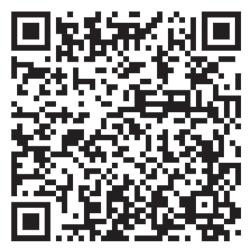

1. First gentleman
5. Coiled telephone part
9. Concur
14. A crewmember of Argo, perhaps
15. Swan genus
16. Nest
17. Muscat’s land
18. White house city
20. Ravenclaw with radish earrings
22. Slytherin with slickedback hair
23. Remains of a fire
1. “Get ___ of yourself!”
2. Voice reservations
3. Spanish spider
4. Host to an iconic grand prix
5. Dia de los Muertos Disney film
6. Name of five Norwegian monarchs
7. Salmon coloured spoonbill species
8. Progresses s-l-o-w-l-y
24. Little bowwow
27. Chick that gives a hoot?
30. Hard, glassy covering
33. It’s one fourth of a tbsp. down under
36. Bitter pub drink
37. Capital of the Phillipines
38. Pets and pests
41. An unsinkable ship, until it sunk
42. Slogan often repeated
43. Veggie with a black eye
44. Doc __, Spider-Man foe
45. “Hello” singer
9. Musician Parks or Guthrie
10. Egg on 11. Gryffindor with ginger hair
12. It exits full-screen
13. “When will u be here?”
19. Queen’s Rhapsody
21. Flo Rida song about “Shawty”
24. Acid in a chain
25. What Indiana Jones might be looking for
Spilling Sounds
46. Subscribe again
49. Word with pop or rock
50. Love in lima
52. Attire on roman statues
56. Figure in the sky, or a hint to the shaded squares
60. Kayak is one, canoe is not
63. An unexciting drill?
64. Be real
65. American gymnast Lee
66. Alternative to blinds
67. Smith’s chips parent company, casually
68. ____’acte (intermission)
69. Ivan IV was the first
26. Bad press
28. Damien Chazelle film about jazz
29. Chicago trains
31. Unforgettable King Cole
32. Actress De Armas
33. Label for Gaye and Wonder
34. Turbo or Gary
35. Noir or grigio
39 Any of the Andes (abbr.)
40. “___ we there yet?”
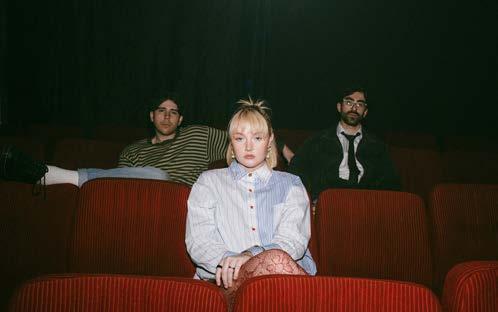
Grxce are a Sydney-based group pushing the boundaries of the current Australian music scene. Their sound, often being compared to the likes of Paramore and beabadoobee, weaves through pop, shoegaze, punk, and grunge genres — an incredibly versatile band that fits almost anyone’s taste in music.
Their music takes listeners through the journey of finding yourself in your 20s with the unique struggles of the current day. The rawness of their newest release, ‘shirt song’, hits the gut like no other — a heartbreaking (and relatable) song that copes with the pain of a ‘casual’ relationship and the unrequited feelings that come alongside it.
Having been no strangers to a good live show with their history of supporting well-known bands, such as The Rions and The Rubens, Grxce have a few shows lined up in the coming months:
30th August - Bootleggers 2nd Birthday Bash, Sydney (7pm) 6th September - The Underground UTS, Sydney (7pm) 13th September - La La La’s, Wollongong (7pm)
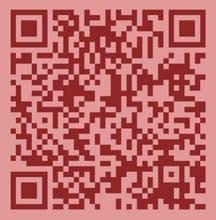
Check out the band on Spotify here!
The Masc Crossword
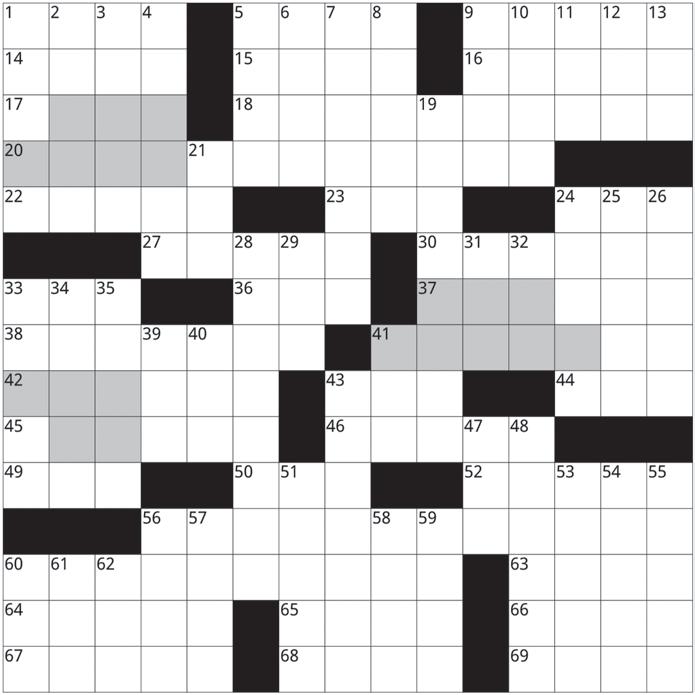
41. Drive supporter
43. Me, myself, or I
47. Summer in Senegal
48. It poops cubes!
51. Code that’s dits and dahs
53. Hired henchmen
54. Main hemoglobin highway
55. Smile snidely
56. Go off target
57. 2016 Rihanna album
58. Raph, Donnie, Mikey, and Leo
Semester 2 Week 3 Crossword Answers
or reading
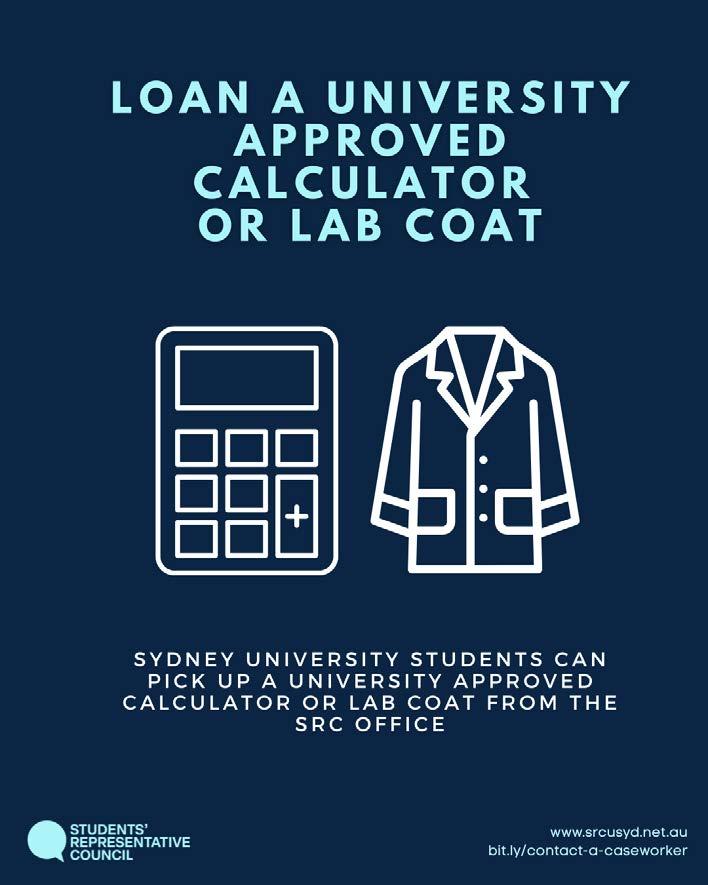

Special Buys Bad. Same.
MEN-Strual Cups

To hold all of the sympathy you have for the people in your life on their period, your life is sooo hard cause you care so much :(
Peepee LaPooPoo
It’s not a Labubu, it’s your tenyear-old cousins old cabbage patch doll and that’s why it has skidmarks all over it, because your cousin shit on it. Benson Boone.

Lockheed Martin Scarf
If the heat from the missles doesn’t warm your cold corporate heart, try this scarf.
william winter
The Smentmorth Smedal

Awarded to the student writer who believes in NO free speech!! NO more protestors!!! Silent students!!!!!!
1 x F-Slur Pass
Cut this out to use anytime. Single use only. Say it with your chest. With love from a homosexual.
